SUPPORTING YOUNG PEOPLE’S MENTAL HEALTH




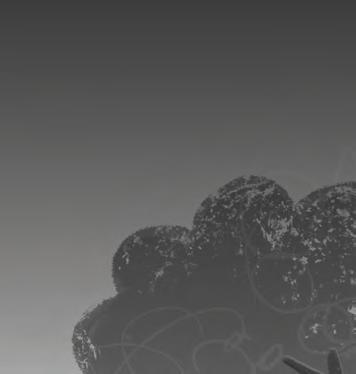


The magazine of the Royal College of Paediatrics and Child Health INSIDE SPRING 2023
for paediatric mental health Page 18
Better care for older children Page 20
with young trans and genderquestioning people Page 19
outcomes for asthma patients Page 21
Collaborating
AYPH:
Working
Improving
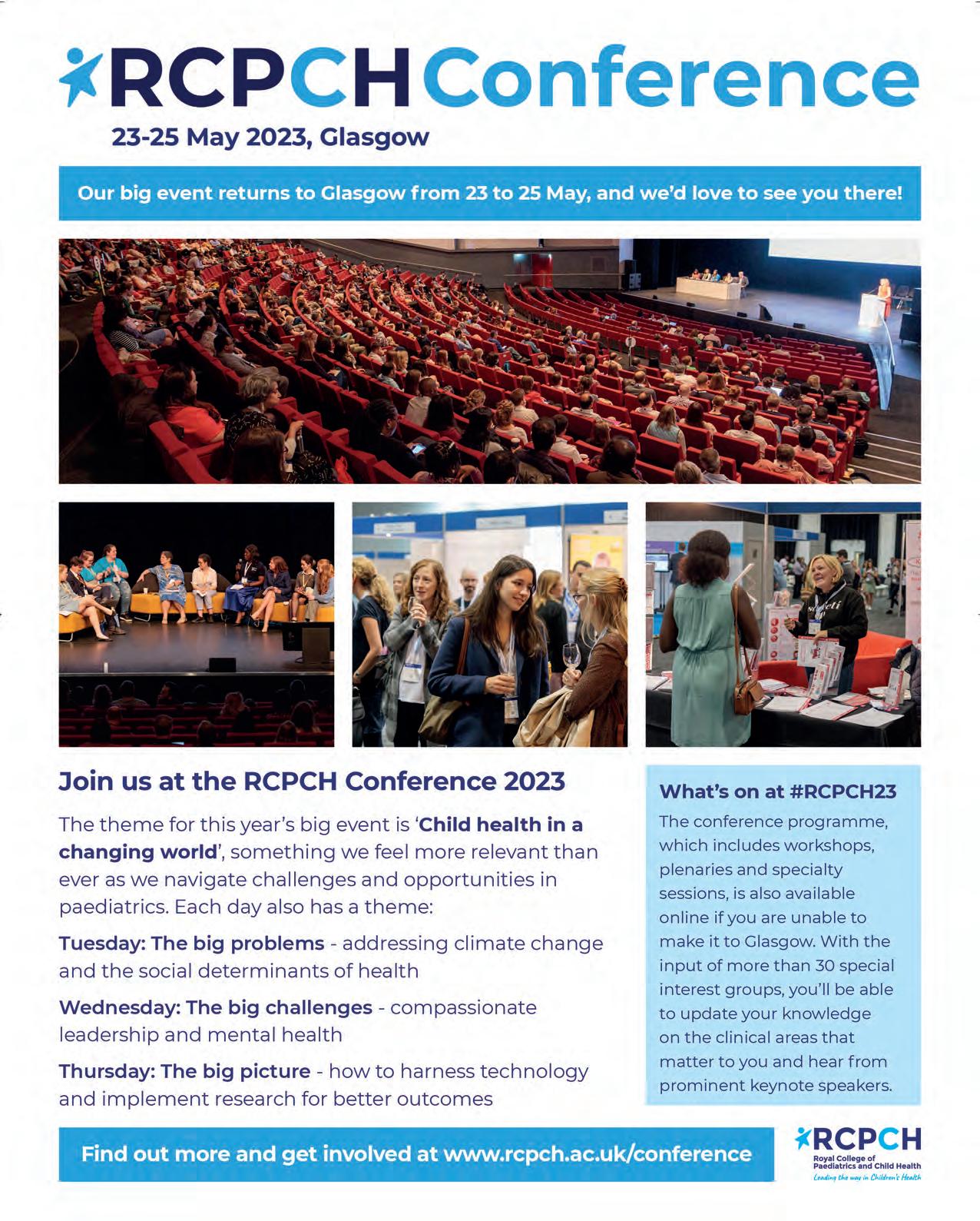
Editor ’s pick
I trust you all heard the sizzle as this came through your letter box and scooped it up before it caused too much damage to the hallway carpet. This edition of Milestones is nothing short of RED HOT!
In the spring edition we are turning a sharp focus on the crisis in children and young people’s mental health.
This is a challenging and divisive topic, but this magazine is full of stories of members who are tackling CYP mental health head on through relentless advocacy, energetic change and spectacular innovation.
I challenge you to put this one down!
I’m incredibly proud to introduce this edition and be part of the Milestones team. A massive thank you to my fellow editors and the amazing Aisling Beecher at RCPCH who runs our motley crew, and of course thank you to our members who have filled the pages so exceptionally well.
Dr James Dearden Paediatric Consultant




Torbay Paediatric Mental Health
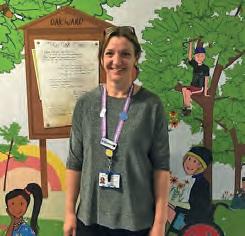 Lead
Lead
CYP Mental Health Advisor Devon ICB
Torbay and South Devon NHS Foundation Trust
@drjamesdearden
19
THIS ISSUE
16 30
20 Mind the gap
Are patients missing out between paediatric and adult health services?
21 Asthma
New ideas to improve outcomes for CYP with asthma
EVERY ISSUE
12 How paediatricians can support children and young people's mental health
Six members give their views
16 The kids aren't alright
Dr Ian Rodd shares his personal experience and how we all have a part to play
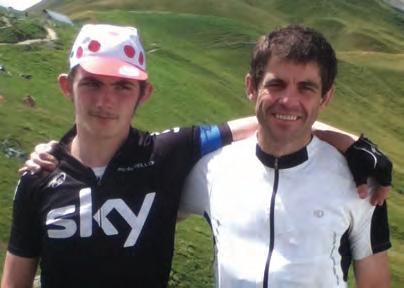
4 Update
The latest from the President, news, opportunities and more
11 RCPCH &Us
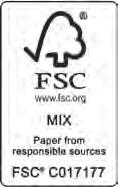
One dad reveals the truth about diagnosis
18
19
Three simple tips to become more inclusive

22 Members News and views from members
27 International Working in Malaysia
28 Wellbeing
Mental illness as a medic
30 A day in the life
Mental health lead Dr Anna Kyle
KEEP IN TOUCH Milestones SPRING 2023 3 Contents Spring 2023 Copyright of the Royal College of Paediatrics and Child Health. All rights reserved; no part of this publication may be reproduced, stored in a retrieval system, or transmitted in any form by any means – electronic, mechanical, photocopying, recording, or otherwise – without prior permission of the publishers. The views, opinions and policies expressed in Milestones do not necessarily reflect those of the College. While all reasonable efforts have been made to ensure the accuracy of the contents of this publication, no responsibility can be accepted for any error, inconsistency or omission. Products and services advertised in Milestones are also not recommended or endorsed by the College. Readers should exercise their own discretion and, where necessary, obtain appropriate independent advice about their suitability. Royal College of Paediatrics and Child Health is a registered charity in England and Wales (1057744) and in Scotland (SC038299). Registered address: 5-11 Theobalds Road, Holborn, London WC1X 8SH. Design Manager: Christina Richmond Senior Editor: Lizzie Hufton Publisher: James Houston. Milestones is published four times per year on behalf of the Royal College of Paediatrics and Child Health by James Pembroke Media, 90 Walcot Street, Bath, BA1 5BG. T: 01225 337777. Advertising: Alex Brown, Head of Corporate Partnerships advertising@rcpch.ac.uk @RCPCHTweets @RCPCH @RCPCH milestones@rcpch.ac.uk EDITORIAL Managing editor: Aisling Beecher @AislingBeecher Editorial board: Dr Seb Gray @SebJGray Dr Hannah Baynes @HLB27 Dr James Dearden @drjamesdearden Dr Dita Aswani @DrDita Dr Maddy Fogarty Hover @I_am_spottacus Contact We’d love to hear from you – get in touch at milestones@ rcpch.ac.uk
Collaborative working in paediatric mental health
How different teams can work together to improve outcomes
Working with young trans and genderquestioning people
The latest news and views




CHALLENGES AND OPPORTUNITIES – HOW PAEDIATRICS WILL BE SHAPED IN 2023



I AM DELIGHTED TO WELCOME YOU to the spring 2023 edition of Milestones
I imagine that the editorial team have felt the weight of responsibility for producing an edition to lift spirits, mend morale and inspire the creation of new ideas and solutions to fix the seemingly endless problems we seem to be facing globally in healthcare delivery. The most recent winter in the Northern Hemisphere has seen unprecedented demands placed on our healthcare systems and even some of our hardiest battle worn paediatricians have been heard muttering, “I’ve not seen anything like this in the last 20 years…”
There is no doubting the extraordinary pressures we are all under. However, I am convinced that 2023 will see us celebrating and sharing solutions, innovations and ideas. Despite the difficulties, I know we will pull together to support each other and find resources to help our teams, and teach and train the next generation of child health clinicians. Paediatricians are renowned for their ability to rise to the occasion, even in the face of adversity, and while we should never take this for granted, together we will achieve much this year. The way in which paediatricians are developing their skills and clinical confidence to address the huge rise in children with mental health problems is just such an example, and this edition provides ample evidence of that.
Milestones
The RCPCH Conference in Glasgow from 23-25 May will be a guaranteed antidote to burnout and misery. I’ve been privy to some of the planning committee meetings and can assure you that programme plans, as well as the wider social calendar, are not going to disappoint. There is an eye-watering selection of science, clinical medicine, wider professional topics and then just the downright funky, fun and crazy too! So be there or be square!
2023 is also a big year for UK paediatric training and we approach the summer implementation of our Progress+ training programme with anticipation. So much hard work has gone into preparing for the 2023 kick-off and so I’ve certainly got this on my ‘watch’ list.
My huge thanks again to our fantastic editorial team who balance their Milestones commitments with busy clinical jobs. We are truly indebted to you for another fantastic edition.
With my best wishes to you all, Camilla
KEEP IN TOUCH
We’d love to hear from you, get in touch through our channels
Twitter @RCPCHTweets
Facebook @RCPCH
Instagram @RCPCH milestones@rcpch.ac.uk
MEET OUR NEW CEO
Robert Okunnu RCPCH CEO @ROkunnu

THE START OF THE YEAR always offers the opportunity to look ahead – and as we are already in the early months of 2023, it has been a challenging time with pressures on the NHS continuing to be a theme carrying over from last year. Times like this highlight the need to be responsive to those issues that come up as well as making sure that sight is kept on a range of activity that a medical royal college like us undertakes day-to-day.
Coming in as CEO, I am energised by the College’s great strengths in having such a distinct and inspiring mission and vision. This provides us with an exciting focal point for what we do and the difference that we want to make.
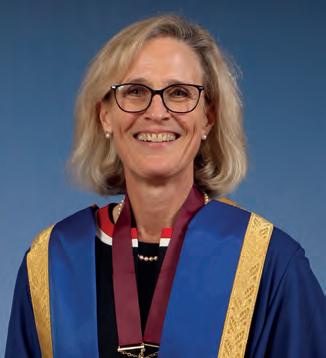
Our 2021-24 strategy, rooted in the mission and vision, has also helped us in offering a useful set of ‘guiderails’ for direction. The four strategic aims around improving quality and care; building skills and knowledge; influencing others; and developing our community are helping in our efforts to support the fantastic variety of projects, programmes and other work at the College. And through delivering the strategy we are learning much, which will be useful insight for the future.
Coupled with all this is the fact the College has amazing people, working hard together to make sure that we are delivering on our ambitions. College officers and other members make valued time available – and staff and trustees also play key roles. I am struck by the breadth of committees, groups and other opportunities for our members to get involved in. We recognise and greatly value your dedication. Thank you.
Judging by the wider world, the year ahead is likely to share some similar themes to the year just gone. Whatever may come, we are clear in what we need to do to advance paediatrics and child health.
04 SPRING 2023
Dr Camilla Kingdon RCPCH President @CamillaKingdon
CURRICULUM DOMAINS
Supporting front line work
IN ALL THE BOARD
Joanne Shaw Chair of the Board of Trustees @EvolvingPatient
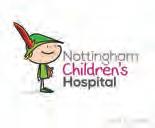


ROLES I’VE HELD (and there have been a few) the most memorable days have been spent, not sitting around the table in a boardroom, but out with colleagues visiting the front line, whether in a call centre, operating theatre, or in the cold and mud of a Riding for the Disabled centre. Joining the College in the middle of the pandemic severely limited opportunities to get out and about. But as things opened up, I’ve been fortunate to have visited Birmingham Children’s Hospital, Alder Hey and, most recently, I’ve had a remarkable day in Nottingham, kindly organised by the College’s Treasurer and community paediatrician Liz Marder.
We were joined by the College’s new CEO Robert Okunnu and Director of Corporate Services, Paul Marchant on visits to the Community Paediatric Clinic in the impressive multi-use St Ann’s Valley Centre, to Rosehill School, a community special school for children and young people with autism spectrum disorders, to Liz’s base, the Child Development Centre on the City Hospital campus. Then into the hospital itself to visit the neonatal unit, followed
by meeting paediatric trainees, a walk round the children’s hospital including the children’s ED, and finishing at the CYP Sexual Assault Referral Centre (SARC). It would be hard to pick out highlights from such a varied and stimulating programme. Thinking back over everything we had seen and heard, we were struck by the astonishingly varied settings, including some excellent facilities in both community and hospital (in particular the SARC). Overall though, the most powerful impression was of the incredibly high standards, enthusiasm and dedication of all the doctors we met, notwithstanding some of the frankly shocking conditions under which they have to work. We took away a number of suggestions about how the College could better support our members and were all reminded of how valuable it is to understand better the front line work which the College exists to support. We are really grateful to Liz for organising the day and for all her colleagues for taking time out to help educate and inform us. We want to represent all our members and would like to visit more of you to capture the wider paediatric workforce issues. If you would like to host a visit by Trustees or College staff, please do get in touch, we would be delighted to hear from you.
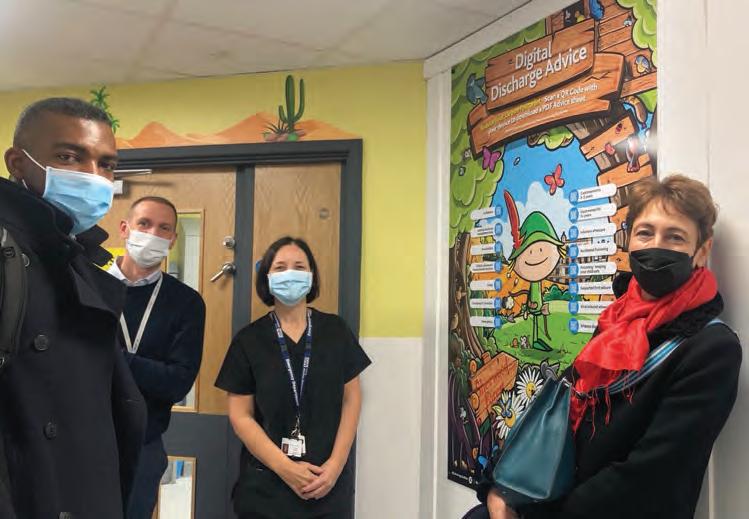
HEADS OF SCHOOLS
79 TRAINING PROGRAMME DIRECTORS
278 COLLEGE TUTORS
UPDATE Milestones SPRING 2023 05 RCPCH FACTS PAEDIATRIC TRAINING
16 SPECIALTIES
18
11
Robert, Paul and Joanne visiting Nottingham Children’s Hospital
Introducing our Genomics Programme
Dr Ngozi Edi-Osagie Consultant Neonatologist Manchester University NHS Foundation Trust

 RCPCH Officer for Genomics @ngozi_ediosagie
RCPCH Officer for Genomics @ngozi_ediosagie
I’M DELIGHTED TO INTRODUCE MYSELF as the new Officer for Genomics and Chair of the Genomics Working Group (GWG). So, what’s a jobbing neonatologist doing chairing a working group on genomics, you may ask. I think it’s sometimes quite useful to have a non-expert Chair, especially as the adoption of genomics in clinical practice is ever expanding and will impact more widely on our patients and practice in the future; genomics is set to become more mainstream. However, I’m really grateful to expert colleagues working in genetics who volunteered to join the working group as their guidance will be invaluable. I’m also supported by Charlotte, our genomics project manager, whose
input has been vital.
I’m fortunate to have had quite a varied career so far and been involved in lots of different things that keep my working life interesting. One of my roles is national specialty adviser for neonatal critical care for NHS England, and it was as part of this role that I was invited to join the working group for the Genomics England Newborn Genomes Programme to represent NHSE and the College. This is a programme which will evaluate the feasibility of screening newborns for a larger number of childhood onset rare genetic conditions, where early intervention is crucial and can make a significant difference to outcome. It’s been a privilege to be involved in this evaluation.
Does the College need a working group in genomics? Yes, it does, especially as the Genome UK Strategy and the NHS Long Term Plan is committed to harnessing the power of genomics to improve population health. These plans will be far reaching, not just for our patients but also for paediatricians as we will need to consider the workforce and training implications.
One of the aims of the GWG will be to try and ensure paediatricians are aware and engaged in the changes to practice. To this effect, the GWG will be hosting a series of webinars and have also planned a number of activities for our ‘month of genomics’ in March, in collaboration with HEE Genomics Education Programme. Please visit our webpage for more information on our activities and get involved.
Visit: www.rcpch.ac.uk/genomics
Staff Spotlight
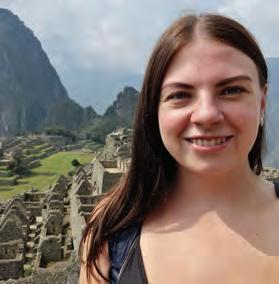
Lizzie Allen Curriculum and Quality Coordinator
I JOINED THE COLLEGE a little over a year ago and, in the short time I have been here, I have worked on so much I feel proud of. Part of my role is working with our Assistant Officer for Trainer Development, Dr Lizzie Starkey, to produce a range of resources, running events for educational supervisors and College tutors and sharing good practice covering all things training related!
Most of my time in this role is spent on preparing for Progress+ implementation by producing lots of useful resources for trainees and trainers. This has included the principle of the month campaign, producing guidance on what Progress+ means for current trainees and ensuring we are engaging with our main stakeholders to ensure everyone feels as prepared as possible. We are really excited about Progress+ and the flexibility it will provide trainees as they start to build their career in paediatrics.
When I’m not raving about Progress+ you’ll find me hiking in the British countryside, travelling, spinning or eating pasta!
Visit: www.rcpch.ac.uk/progressplus
UPDATE 06 SPRING 2023 Milestones
REPRESENTING OUR SENIOR MEMBERS
Dr Andrew Long Retired Consultant Paediatrician RCPCH Representative for Senior Members, Senior Fellows and Honorary Fellows @amlong12
I AM PLEASED TO INTRODUCE MYSELF as the new Senior Members and Fellows Representative to Council. I must give due credit to my predecessor, Kevin Windebank, who represented the senior echelon through what must have been the most challenging time for the College in recent times and encouraged us all to embrace new technology to stay in touch with each other (old dogs, new tricks?)!
I am fortunate to have been involved with the College in a variety of roles since 1999, mostly through contributions to the College’s commitment to education and training. My passion has always been to promote and foster high quality medical
education and to support the creation of opportunities for paediatricians in training (both within and outside HEE programmes), to excel through clinical and academic excellence and by taking on a range of leadership roles to prepare for their future roles.
After 43 years working in the NHS, I retired from my role as a general paediatrician at GOSH in January 2021. I was involved in pilot work with NHS 111 during the pandemic and spent the last five years of my professional life working in a range of senior roles including being responsible officer and associate medical director. I also worked with NHS Resolution, the GMC and the Academy of Medical Royal Colleges in work to support doctors experiencing difficult and stressful experiences in their professional lives.
My interests outside medicine include baking; beekeeping; cycling (Surrey, Kent and Kenya!); dog walking (Labradoodle); gardening; singing (bath and choir) and taking an active interest in the lives of my children and seven grandchildren.

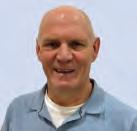
I’ll be running monthly Zoom calls for senior members as well as sending monthly ebulletins. My aspirations within this role are to continue Kevin’s great work in establishing an active ‘community’ of retired paediatricians; to encourage the retention of a fantastic skillset in supporting the College in all aspects of its work, but especially in Thrive Paediatrics, to support paediatricians and ensure that they feel valued in all aspects of their careers from the beginning of training to retirement and beyond!
Visit: www.rcpch.ac.uk/thinking-about-retirement
Keep up to date with our Climate Change Working Group
Professor Shunmay Yeung Honorary Consultant in Paediatric Infectious Disease St Mary’s Hospital, London

I GOT INVOLVED in the College’s Climate Change Working Group (CCWG) because, although nature and environmental sustainability have always been important to me, they haven’t been part of my ‘work’ life. In the last few years, I’ve wanted to change this. Since Katy Rose and I took over leadership
of the CCWG Research Workstream, we have been working closely with the other members to deliver our 2022 commitments and prioritise what we want to achieve in 2023 (see more in our upcoming CCWG ‘One Year On’ report).
One of the most exciting things we have launched is a Climate Change and Child Health ebulletin. We are aiming for this to become a key means for paediatricians interested in climate change to keep updated with the
latest publications and happenings around climate change and children’s health, and to provide suggestions for things paediatricians can do. Our first theme was air quality, infectious diseases came next, and we will have future themes around equity, heat, and food systems.
There are lots of other exciting things in the pipeline for 2023. We are working closely with RCPCH &Us, our young people’s network, and will have more to share with you on that later in the year. Finally, we have lots of exciting climate change-related activities planned for the RCPCH Conference in Glasgow –so we hope to see you there!
Sign up to our ebulletin to keep up to date with all our activities: www.rcpch.ac.uk/form/climate-change-ebulletin
UPDATE Milestones SPRING 2023 07
BPSU: Investigating rare diseases BMJ Paediatrics Open

WHAT STUDIES ARE THE BRITISH PAEDIATRIC SURVEILLANCE UNIT (BPSU) RUNNING?

‘YOUNG VOICES IN THE TIME OF COVID-19’
Dr Peter Davis Consultant Paediatric Intensivist Bristol Royal Hospital for Children @BPSUtweet




The BPSU is conducting surveillance on six conditions: ‘Progressive intellectual and neurological deterioration’, ‘Congenital rubella’, ‘Outcome of resuscitated term babies with no heart rate detected at 10 minutes’, ‘Acute hepatitis’, ‘Neonatal stroke’, and ‘Near fatal asthma’. If you have reported a case for a completed study, you may receive an email with a follow-up questionnaire.
WHY HAVE I BEEN RECEIVING TWO MONTHLY EMAILS FOR BPSU STUDIES?
I am sorry if you have been confused by receiving two monthly emails for reporting cases. The two most recent studies (‘Neonatal stroke’ and ‘Near fatal asthma’) are on a new data collection platform based at the University of Dundee and reporting cards are sent by them on behalf of the BPSU from noreply@dundee. ac.uk. Hopefully before the end of 2023, all studies will report via just one email. If you are signed up to BPSU but have not been receiving emails, please contact us.
HOW DO I FIND OUT ABOUT COMPLETED BPSU STUDIES?
Our webinar series of completed BPSU studies re-launched in November. In conjunction with the College, we held a webinar on ‘Listeria Infection in Young Infants’. More than 150 people joined the live event, with more watching the recording. More webinars are planned for 2023 including: ‘Systemic Lupus Erythematosus’; ‘Food protein-induced enterocolitis syndrome’; and ‘Bronchopulmonary dysplasia’. Watch out for details from the College on how to book a place. Visit: www.rcpch.ac.uk/bpsu
Imti Choonara BMJ Paediatrics Open Editor-in-Chief @BMJ_PO
was the focus of a collection of articles published in BMJ PO. The articles reflected the anxieties and difficulties experienced by young people during the pandemic. Working with ISSOP (the International Society for Social Paediatrics and Child Health) we published articles
from Europe, Africa and Asia. Our next special collection has a geographical focus featuring articles about child health in China. China has made major progress in reducing poverty, but still has huge inequalities between rural and urban areas and between the underdeveloped western regions and the prosperous eastern regions. The aim of the special collection is to both publish more articles from China, and to encourage research that reduces inequalities and improves child health, especially for the most disadvantaged children.
JOURNAL: ADC JOURNAL UPDATE
ANTHROPOLOGY: LESSONS 1-3
Part 1. From my vantage point with COVID still (intermittently) kicking, one of the most interesting features of pandemics is the effect on behaviour on every facet of quotidian routine.
Nick Brown Archives of Disease in Childhood Editor-in-Chief @ADC_BMJ
A systematic review by Damian Roland and colleagues, comparing ED attendance in the COVID, MERS, SARS, Ebola, Chikungunya, E. coli and H1N1 epochs unearths markedly different directions of ‘effect’ – is this policy, media or another subliminal factor...?
Part 2. One of the most abrasive and factionalising themes early in COVID-ology was, of course, the role (if any) of schoolchildren in transmission. We took a stance on this: some disagreed – that’s the nature of debate. If not the final say, then as close as possible to drawing a line is a recently published, elegant study by Ermengol Coma and colleagues from Catalonia.
Part 3. The tonsils are classical cherry red in hue, cervical nodes visible from a distance, the rapid test positive and there’s little other than Strep A this could be.
“Last time she was given penicillin, she developed a rash. Surely there’s an alternative.” Well, yes there are, but they’re all broad spectrum and resistance promoting. You know this deep down, but the constraints of time to explain are against you – and the manufacturers of macrolide x become a few pennies richer… Kene Maduemen and colleagues’ survey of response to penicillin allergy debunking unpicks this common vignette. Serious reactions are rare and with more time and interrogation, there’s a window for removing the yoke of an unnecessary label… and proving it, in vivo, to their parents.
UPDATE 08 SPRING 2023 Milestones
Advocating for children and young people’s health
TRANSFUSION IN CHILDREN AND BABIES
Dr Ronny Cheung General Consultant Paediatrician Evelina London Children’s Hospital RCPCH Officer for Health Services @CheungRonny




I AM THRILLED TO TAKE ON the newly created role of Officer for Health Services. Having worked with the College for a number of years, most recently as the Clinical Lead for the State of Child Health programme, it is a pleasure to once again work alongside talented and passionate colleagues at the College to advocate for children and young people (CYP).

And what a time to take office. Child health is at a critical juncture. The Health & Care Act 2022, and the advent of Integrated Care Systems (ICSs), raises the tantalising prospect of delivering population health – both physical and mental – for CYP across organisational boundaries. But this must be achieved against a testing backdrop of workforce and funding challenges – not to mention COVID recovery, a mental health maelstrom, and rising inequality exacerbated by the worst cost-ofliving crisis in living memory.
Like many of you, these are challenges I face daily as joint clinical lead for general paediatrics at the Evelina Children’s Hospital in London, with a foot in both secondary and tertiary children’s services. But necessity is the mother of invention, and I have also seen glimpses of a brighter future with my own eyes: for example, how
South East London’s children’s integrated care collaboration with primary care colleagues has borne tangible benefits both for local CYP and the wider system. And if we look outside child health, we can find a multitude of like-minded allies: in my healthcare quality role at NICE, and previous regional and national health policy roles, I am heartened by the dedication and relentless commitment of (adult and paediatric) colleagues, across primary and secondary care, to improve outcomes for patients of all ages, by leveraging the opportunities that come with new healthcare structures.
As I take up this post, my immediate priorities will be to support our RCPCH Ambassadors to advocate effectively for CYP with their ICSs; to reinvigorate our flagship suite of care standards, Facing the Future, so they are fit for the future (and the present); and more broadly, to listen to our members, and to use the voice of the College to support them to deliver high quality care to CYP in this new environment.
Thankfully this is not a oneman job. I will be working with an exceptionally accomplished and committed group of fellow officers, under the leadership of Dr Camilla Kingdon and Dr Mike McKean. It will take all our combined endeavor, ingenuity and experience, to ensure the College can advocate effectively for children and young people’s health with a united and influential voice. I am excited to work with them, and all of you, to grasp this opportunity together.
THE UK blood service for the first time announced an ‘amber alert’ due to red cell shortages. Many of you will have seen the reports in the press. This serves as a timely reminder that blood products are a scarce resource and as paediatricians, we have an obligation to make sure we are using this resource appropriately. We also know that babies and children are overrepresented in transfusion incidents reported to SHOT (SHOT is the UK blood safety/haemovigilance organisation). This is particularly in the category of wrong component transfused, failure to meet special requirements and also in avoidable, delayed or over-transfusion. It seemed therefore a good time to signpost you all towards some resources to promote safe and appropriate use of blood products.
LAST YEAR
In terms of minimising transfusion, we know that minimising iatrogenic blood loss by blood sampling is important, as well as using the appropriate transfusion threshold or trigger level together with the correct volume (prescribed in mL) for the child. Optimising iron and haematinic (B12 and folate) status is also important and remember that children who are chronically iron deficient and asymptomatic can be given iron and not blood. In surgical patients the use of tranexamic acid for patients expected to have moderate blood loss or higher and use of cell salvage where appropriate will also reduce the need for allogenic blood transfusion.
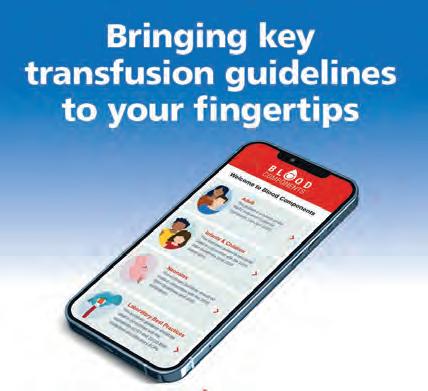
You can download the Blood Components app via Apple and Google Play.
Paediatric SHOT Bite (short summary): www.shotuk. org/resources/current-resources/shot-bites
SHOT paediatric video: www.shotuk.org/resources/ current-resources/videos
Transfusion book-mark: hospital.blood.co.uk/theupdate/revised-neonatal-and-paediatric-bookmarks
UPDATE Milestones SPRING 2023 09
Dr Anne Kelly Consultant Paediatric Haematologist
Great Ormond Street Hospital
Working with young trans and gender-questioning people

Three simple tips to help you improve patients’ experiences
Diary Dates
Listed below are some of the up and coming online courses and events. We will continue to add to this list over the coming months, so don’t forget to keep an eye on our website.
Read more
WEBINARS
#ShiftTheDial: child health inequalities
7 June
3 July
Find more dates at www.rcpch.ac.uk/ courses www.rcpch.ac.uk/ events See more See the College’s webinars
This webinar covers how paediatricians can support children and families experiencing poverty, design NHS services to address health inequalities and advocating for change in government policy.
Whole genome sequencing for newborns
Hear about recent developments, updates and future perspectives in paediatric genomics and the Newborn Genomes Programme.
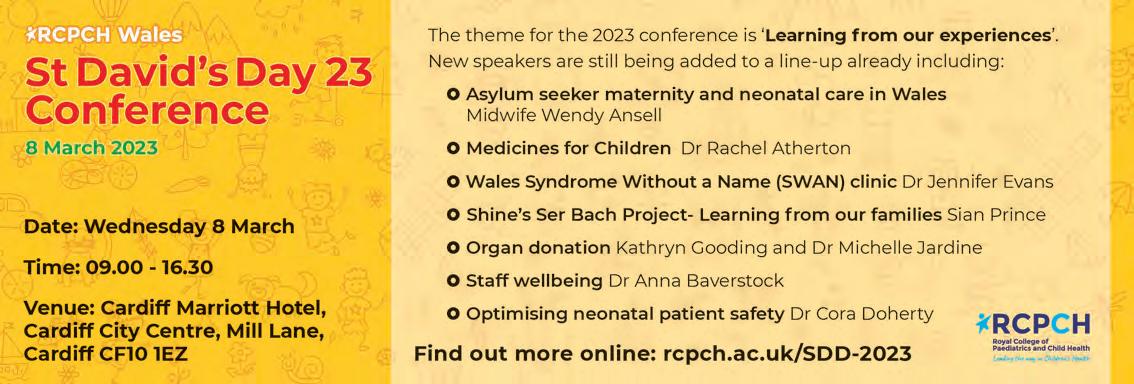
Checking and validating your NNAP data: what you need to know
Listen to the National Neonatal Audit Programme team and guests to learn about why we ask you to validate your data for certain metrics and how to do it.
www.rcpch.ac.uk/webinars
UPDATE 10 SPRING 2023 Milestones
p19
academic
15
Effective
Supervision
Gastroenterology 20
How
Non-malignant haematology 23
MRCPCH
Knowledge in Practice exam preparation 30
Effective
RCPCH-NIHR
trainees day
March
Educational
18 March How to manage:
March
to manage:
March
Applied
March
Educational Supervision
Supporting
Statement
26
18 April How to manage: Paediatric sepsis –Exeter 28 April
named and designated doctors for Looked After Children 17 May
and report writing – England/ Wales (Level 3)
May
How to manage: Refugee and asylum seeking CYP
Effective
Educational Supervision
Statement and report writing – England/ Wales (Level 3)
paediatric
6 July How to manage: FASD in community
services
5 October
The truth about diagnosis
Venner shares his experiences as a dad of a child with complex special needs to help services to think about how they support families in the future

VERYONE WANTS THE BEST for their child regardless of their health, education, job – you name it. However, when your child has a medical emergency that changes their life and yours, the image of what most call a ‘normal’ life is shattered. This is when you need people around you that are willing to help pick up the pieces and help you accept and rebuild your life, including your work, family, friends and everything.
Work: You may have to tell your employer everything and that it may affect your duties. They will either understand and help you through it or they will try to tell you to leave it at the door. Sometimes this isn’t possible, especially in the beginning, you may have nearly lost your child and have complex medical needs to deal with.

Family and friends: You will find out who really is there for you. Some family will pretty much disappear
and say that they are too afraid to help or don’t know how to. Others will be willing to do anything and treat you and your family no differently. These are the ones that will always be there for you when your armour is cracked and broken. They will listen to your rants and concerns, or make you feel calm even just for a moment and forget that life is usually a hurricane.
Men: We are programmed not to show weakness or emotion, an image that needs to be abolished. The mother will be asked how they are, most of the time the dad will not be seen as someone who needs support. This is something that needs


to change, as more and more men look for help, they are usually greeted with a blanket approach of contacting this group or that organisation.
What can health teams do? This time is the hardest and most confusing. However, you find once you get through this and have settled into a new way of life, even though it has its challenges and lows, seeing your children hit their milestones –even if delayed – is even more impactful and joyful.
Let parents know they shouldn’t be afraid to look for help, or to direct their anxiety and worries into helping make a change. That is what I have done in the epilepsy community, and it has helped not just me and my family, but many that use the NHS across the UK.
Support them to find out more, as the more information they have, the more they have the ability to deal with and accept what has happened and take the next steps forward. There are some charities that have dedicated themselves to empowering people and giving them a reason to shine, not hide. Share these with parents and support them to get in touch and get involved.
RCPCH &Us: The Children and Young People’s Engagement Team delivers projects and programmes across the UK to support patients, siblings, families and under 25s, and gives them a voice in shaping services, health policy and practice. RCPCH &Us is a network of young voices who work with the College, providing information and advice on children’s rights and engagement.
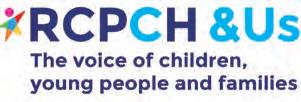
@RCPCH_and_Us
@rcpch_and_us
@RCPCHandUs and_us@rcpch.ac.uk


KEEP IN TOUCH RCPCH &US
ABOUT Milestones SPRING 2023 11
Venner RCPCH &Us volunteer and member of the UK Paediatric Epilepsy Programme Board
a
Visit: contact.org.uk/help-for-families/information-advice-services
EDealing with
diagnosis can be tough for parents
HOW PAEDIATRICIANS CAN SUPPORT CHILDREN AND YOUNG PEOPLE’S MENTAL HEALTH
In recent years, paediatricians have been faced with an increase in mental health issues in children and young people. What is the role of paediatricians and how can they best prepare to ensure the mental health needs of our young population are met?
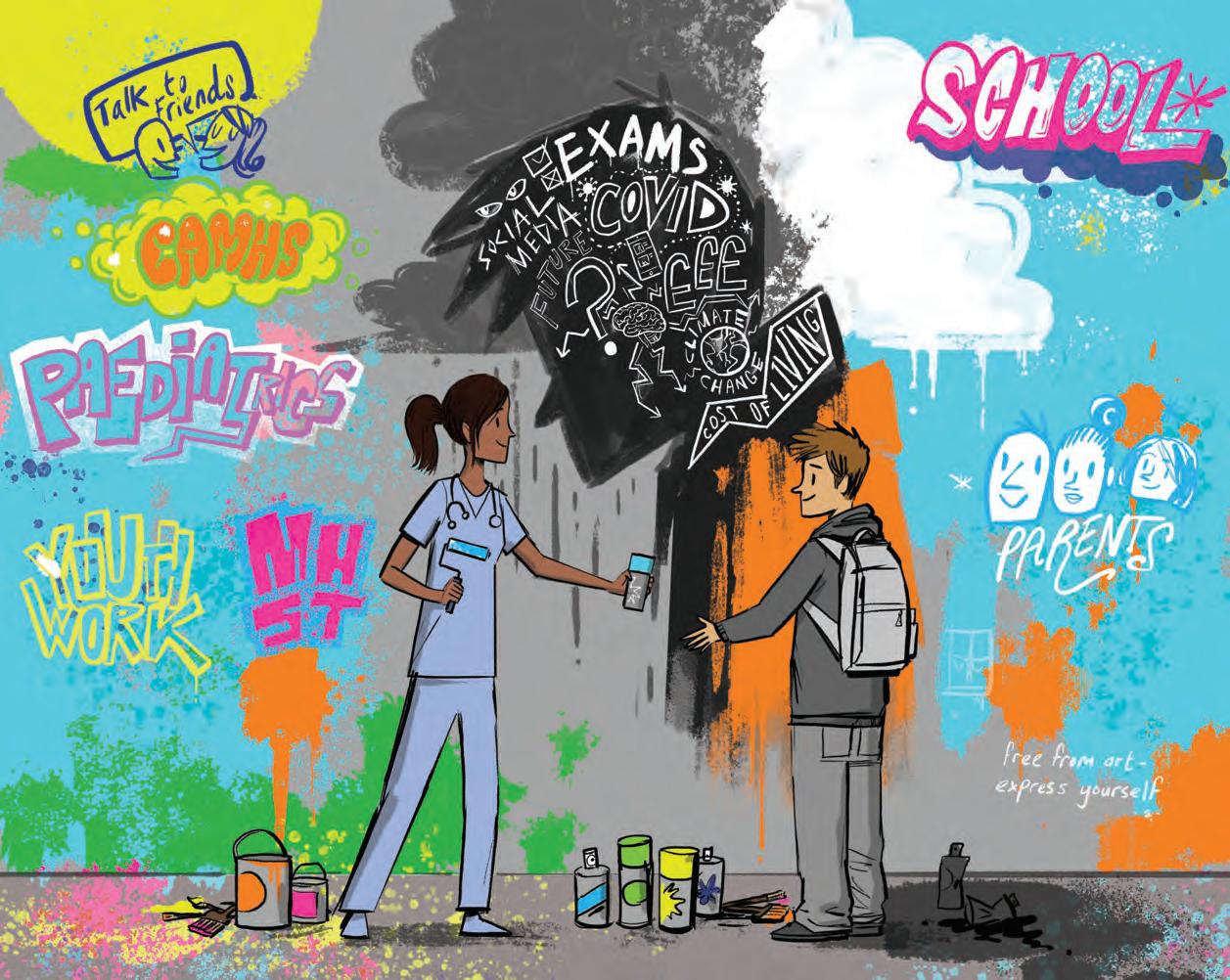
Milestones
12 SPRING 2023
out more
Find
Explore the College’s mental health resources: www.rcpch.ac.uk/mentalhealth Milestones editor and mental health lead, Dr James Dearden has recorded a podcast with contributors from this feature. Available from 1 March, look for RCPCH wherever you listen to your podcasts. www.rcpch.ac.uk/podcasts
Shayna Moellenberg 4th year medical student University of Southampton @ShaynaMoellenb


A MEDICAL STUDENT’S PERSPECTIVE
I OFTEN FIND MYSELF REFLECTING on the words ‘mental health’. What does that mean? A healthy brain, complete safety, a stable support system? Like everything in medicine, I think the answer is personal.
During my paediatric placement on the Isle of Wight, we had a surprisingly high number of mental health admissions. As medical students you often think of the front-page, high-yield topics: asthma, heart
 Dr Olatokunbo Sanwo
ST8 Paediatric Registrar/ Child Mental Health Subspecialty Trainee Cambridgeshire Community Services @toks_dr
Dr Olatokunbo Sanwo
ST8 Paediatric Registrar/ Child Mental Health Subspecialty Trainee Cambridgeshire Community Services @toks_dr




GAINING MENTAL HEALTH EXPERIENCE AS A TRAINEE


I’M CURRENTLY COMPLETING SUBSPECIALTY TRAINING in child mental health. In ST6, I spent a year working in a tier 3 community CAMHS team alongside general paediatrics on calls. After a period of shadowing, I held my own caseload under the supervision of a consultant psychiatrist. In core CAMHS, I assessed and managed children and young people with common mental health presentations such as depression and anxiety. I also learnt how to initiate and manage children and young people on common psychotropic medications. I reviewed children and young people admitted to paediatric wards alongside the on-call CAMHS practitioner and saw several Mental Health Act assessments. I also worked with the neuro CAMHS team, initiating treatment for children and young people with ADHD, and reviewing those on medication.
malformations, neonatal sepsis. Mental health frequently goes forgotten in our studies; however, it formed the bulk of my training and made me fall in love with paediatrics.
We have the privilege of time during medical school. I was able to sit with patients and really spend time building a foundation. Patients spoke to me about their families, their school troubles, the overwhelming pressure that society pounds down on them day-in and day-out. As we explored these complexities, it became clear to me; our paediatric patients are so brave, battling a relentless world, often out of their control. They would suffer in silence, waiting for a hint of support to let them speak their truths. When we listen, I think patients exhale as they reach for the outstretched hand to grab on to. This is what paediatrics was all about for me: complex, challenging,
enlightening. Supporting the whole patient in front of you, from mind to little toe, and remembering that kids sometimes need a little extra help to find their voice.
In my eyes, supporting a child’s mental health is synonymous with keeping their heart beating. To me, mental health is the connecting root that provides the foundation for all human health. I wouldn’t be the woman I am today without the strength of my own support system behind me. If I can pay it forward in any way, it would be to always give my patients the safe space to speak freely. If we, as medical students, can learn how important this is now, we can create a clinical culture that can comprehensively treat every patient. We’ll be able to help them find their own good ‘mental health’ and go on to do what we are most excited about, saving lives.
In ST7 I did a neurodevelopmental themed community paediatric placement, followed by a general paediatrics post with time in paediatric inpatient liaison psychiatry. I’m currently working in community paediatrics alongside an honorary fellowship with a tertiary feeding disorders team and inpatient mental health unit.
The skills I have learnt are useful and relevant in a range of paediatric settings. As a paediatrician, I thought I was already pretty good at communicating, but my CAMHS placement not only improved my history taking by helping me think more systemically, but also taught me a range of skills which I have found helpful when talking to patients, families and even colleagues!
It also helped me understand how CAMHS works operationally, understanding how services work and knowing the range of services available for children and young people, including local third sector mental health organisations.
It is no surprise to any of us that increasingly children and young people with mental health concerns are being seen in paediatric services. With this in mind, and considering the national recommendations for paediatric mental health leads in every trust, as well as paediatricians to be part of eating disorders teams, I would thoroughly recommend training in child mental health for anyone who is interested in bridging the gap between physical and mental health.
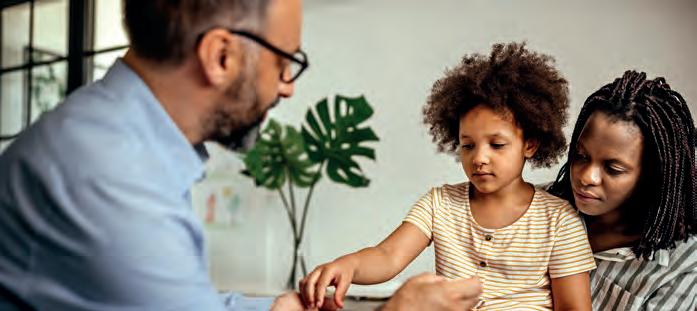

Milestones SPRING 2023 13 FEATURE
Working with CAMHS can improve your communication skills
Dr Karen Street Consultant Paediatrician Devon Partnership NHS Trust RCPCH Officer for Mental Health @karenstreetkhan





JOIN US AT #RCPCH23
DAY TWO OF THIS YEAR’S RCPCH CONFERENCE in Glasgow will have a ‘mental health’ theme, including a network meeting for mental health leads at lunchtime. There will also be mental health topics embedded in day one and three. This recognises the changing role of paediatricians, leading the way in both the physical and mental health of children. Highlights will be Professor Helen Minnis talking about how paediatricians and psychiatrists can work together, Advanced Life Support Group (ALSG) showcasing their simulation training in mental health acute presentations, and in the afternoon the Paediatric Mental Health Association (PMHA) workshop on the internet and suicide. There will also be an opportunity for anyone in a mental health lead role to meet and share experiences. Do come and join us.
Visit: www.rcpch. ac.uk/conference
INTERESTED IN BEING A PAEDIATRIC MENTAL HEALTH LEAD? DON’T KNOW WHERE TO START?
I AM A PAEDIATRIC EMERGENCY MEDICINE CONSULTANT by background and a named doctor for child protection. Our service, as elsewhere, was experiencing a significant increase in the numbers and complexity of children and young people (CYP) presenting with mental health concerns. Additionally, with demand outstripping capacity of local services, these CYP were often being admitted to our general paediatric wards.
In my named doctor role, there was significant overlap between these patients and safeguarding but I found myself asking the same recurring questions. These patients were often straddling different services (CAMHS social care), but being cared for in an acute paediatric setting, often with minimal or no medical need. However, who had a medical overview of the patient’s journey? Was there a general paediatric medical and nursing knowledge and skill gap when caring for these patients? Who was advocating for the patient? Who was supporting the staff? It was unclear where the overriding responsibility lay. This felt familiar. Patients with mental health concerns needed someone to provide an overview. Isn’t that exactly what a named doctor provides when there are safeguarding concerns? How about appointing a paediatric mental health lead – but using the framework of a named doctor role, as a structure?
The role of the named doctor for child protection is clear and a requirement of all provider organisations (RCPCH: Named Doctor for Child Protection – Model job description and competencies). A large component of the named doctor post is the leadership and strategic development of services as well as clinical support and advice, teaching and training and governance.

As an organisation, there was recognition that there was a significant impact of these CYP remaining in the acute paediatric service and this was likely to continue. There was full support to develop a paediatric mental health lead role which mirrors that of the named doctor role, a tried and tested model. I was appointed in June 2022.
As in safeguarding, where we have advocated for this area of paediatric practice despite being an acute paediatric setting, we have been able to mirror this and advocate for our CYP with mental health needs. Since creation of the role, there is increasing parity for CYP with mental health concerns as with physical concerns and breaking down of barriers to these patients receiving more appropriate care. There is increased inter-agency partnership working, mutual sharing of knowledge and goals and development of inter-agency pathways. There has been development of clinical guidance and physical changes to ward environments to improve care. Collection and understanding the data around these patients has allowed for the successful commissioning of general paediatric consultant time for mental health.
The role remains relatively new, and there is so much to be done. However, the named doctor for child protection provides a road map, allows me to remain focussed on what needs to be done, and where we need to go… not any different to the safeguarding journey really, and that is a tried and tested path, so what better place to start?
14 SPRING 2023 Milestones FEATURE
Dr Samantha Jones Consultant in Paediatric Emergency Medicine University Hospitals of Leicester NHS Trust @SJisinterested
Becoming a mental health lead allows us to influence strategy
Dr Emma Blake Child Mental Health Paediatrician Isle Of Wight NHS Trust

 RCPCH Chair of Child Mental Health CSAC @PaedMHAssoc
RCPCH Chair of Child Mental Health CSAC @PaedMHAssoc
WHERE TO FIND SUPPORT AND TRAINING FOR PAEDIATRICIANS
AS PAEDIATRICIANS, we do not need to be told there is a mental health crisis amongst our children. We can see it all around us. Suicide is the biggest killer of both boys and girls over the age of five. But this is just the tip of the iceberg.
General paediatricians on acute wards are managing an increased number and complexity of young people with mental health difficulties – including mental health crises, behaviour that challenges, neurodiversity and the complications of eating disorders. This is our reality, our new ‘bread and butter’. There will not be a magic tier 4 bed solution. It is not going away fast.
Dr Bo Fischer Consultant Paediatrician/Child Mental Health West Suffolk Foundation Trust





MENTAL HEALTH IN COMMUNITY PAEDIATRICS
COMMUNITY PAEDIATRICIANS alongwith the wider multidisciplinary teams have, for decades, supported patients and their families around more than just their physical health. By nature of the placement in the community and the range of conditions managed – from neurodevelopmental disorders through looked after children to chronic and disabling physical disabilities – there is a high incidence of mental health difficulties and co-morbid or co-existing mental health disorders in the children and families we see.
The mental health burden on the families and the service looking after them has been comparable to those under CAMHS services even over a decade ago. This has gradually
Similarly in community paediatrics – the impact of trauma, poverty, gender diversity, societal adversity and educational challenges are having a huge knock-on effect on mental health and how children are presenting to our care.
In 2020/21 there was an increase in CAMHS referrals of 41% and an increase in eating disorders referrals of 81%. These are not trivial numbers. There has been no equivalent increase in CAMHS staffing. Where is the ‘parity of esteem’? The impact is being felt in all regions of the UK; by generalists and subspecialists.
How can we train and support paediatricians to manage these cases? Firstly –join the Paediatric Mental Health Association (PMHA), come to our conferences, look at our resources online or social media – particularly the excellent webinar series (to be hosted on the HEE eLFH [NHSE e-learning] platform).
Come to the mental health sessions at RCPCH Conference 2023 and take advantage of the range of College training available. The new eating disorders training, for example, really
worsened due to a series of factors (decimation of CAMHS, 2007 financial crisis, the pandemic, austerity). Previous excellent examples of joint working with CAMHS disappeared in many places despite the continued efforts of those on both sides to keep important liaison going. Families have a lengthy, fractured and frustrating experience during their journey through the system, from referral to treatment/ support. Commissioning often failed to consider the non-singular nature of neurodevelopmental conditions, placing ADHD assessment and management with one service and autism spectrum conditions with another, for example. Further to this, negatively influencing long waiting times are factors such as workforce gaps with many unfilled community paediatrics posts around the country and increased public recognition of neurodiversity and neurodevelopmental disorders, which has led to a huge increase in referrals. This is often driven by a desperate need of families to have their children’s needs met in the community, including in nurseries, schools and leisure activities.
Many children and young people with

helps clarify the role of the paediatrician in these cases that cause high professional anxiety.
The College and PMHA are exploring options of a national mental health leads network following on from the NHSE learning collaborative.
The Child Mental Health CSAC (College Specialty Advisory Committee) has developed GMC-approved SPIN and sub-specialty curriculums, for paediatricians wanting to have a special interest or become a subspecialist in child mental health. We would encourage deaneries and trusts to invest in these programmes for paediatricians to allow them to get the training and experience needed to be local and regional leaders.
The College is also exploring with Advanced Life Support Group (ALSG) an Advanced Paediatric Life Support (APLS) style SIMSbased training for acute psychological emergencies – which would be very exciting.
Most of all – get involved. Share your ideas and experience. This is paediatric business. We cannot turn our faces away.
mental health difficulties seen in emergency departments and taking up beds on wards have a recognised or unrecognised condition, such as autism, ADHD, ARFID, sensory difficulties with feeding, FASD, post-traumatic brain injury, for which they should receive support in the community. Improving support and integration between mental health and paediatric services in the community is likely to lead to fewer visits to emergency departments – often a last resort. The vision of well commissioned, integrated and colocated paediatric and CAMHS services has been reported to be expected to lead to cost reduction in addition to a shorter patient journey. We must remember however that community paediatrics and community CAMHS needs to be a part of this. Alongside this, needs-based support should be available in the community before and beyond diagnosis, including well-funded and well-functioning social services, and practical sleep, behavioural and emotional support services to name a few. Improved social care and universal support is an essential part of the solution.
Milestones SPRING 2023 15 FEATURE
The kids aren’t alright
An increasing number of children and young people are struggling with mental health challenges. Dr Ian Rodd shares his personal experience and discusses how we all have a part to play in supporting the mental health of children and young people, as well as their families
Dr Ian Rodd Consultant General Paediatrician Hampshire Hospitals NHS Foundation Trust @ian_rodd



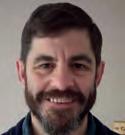
MY FIRST SON WAS BORN IN 1996, two months after my career in paediatrics began. In the coming years I would describe myself as a general paediatrician and father of four. The answer to the icebreaker “How many children do you have?” changed cataclysmically in October 2021, when my eldest son James killed himself, and much has changed since.
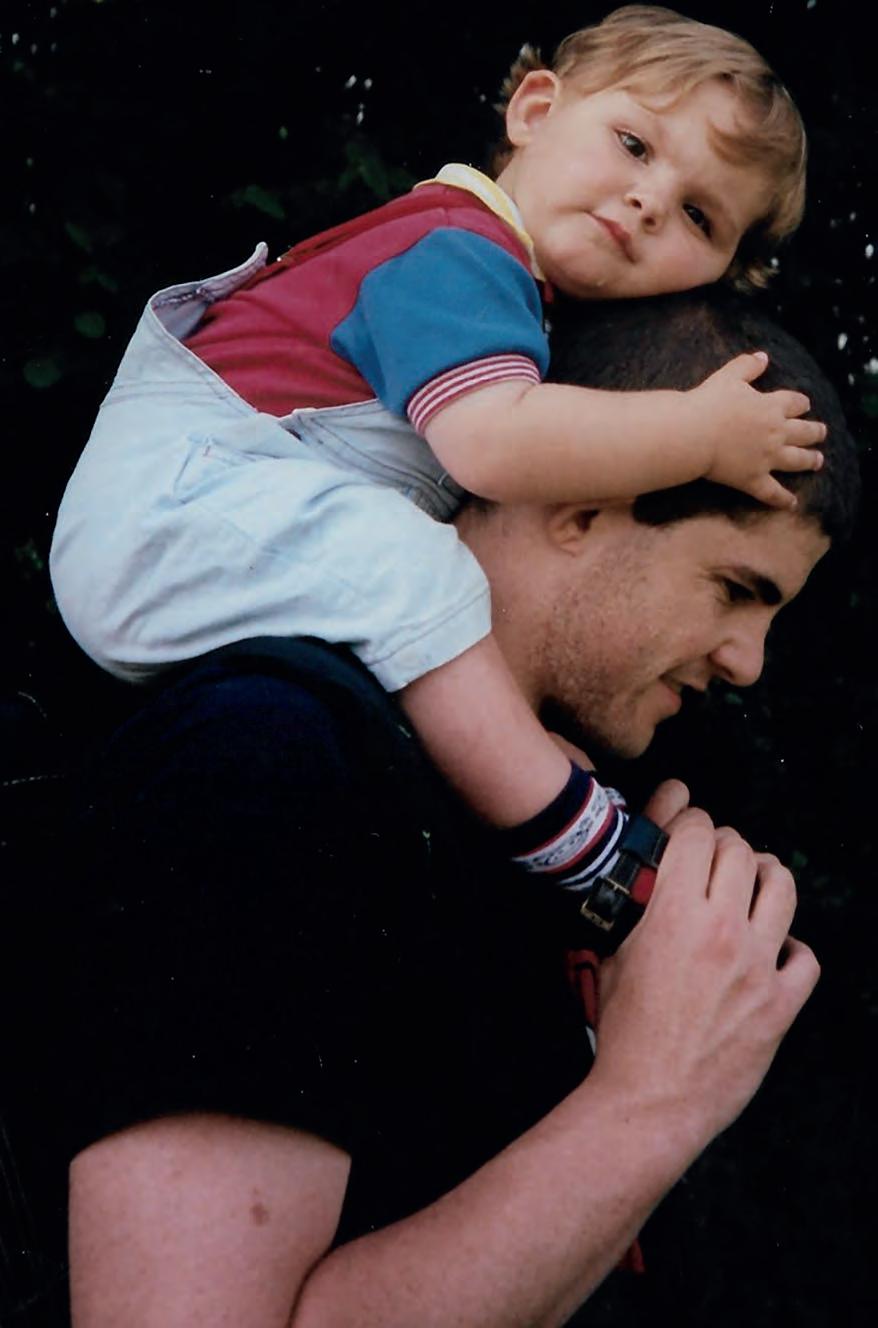
I believe that we need more honest conversations about the mental wellbeing of our children. To have this conversation, we need to consider the way we talk and the language we use, and understand our duty, regardless of what role we have in paediatrics.
Parents need to believe that we can love
our children enough, and help them to feel valued, safe, and hopeful enough, and this is not a bad thing. It is comforting, for both families and professionals, as well as being generally true that if they have the support, love, safety nets and coping strategies they need, then things will be OK. However, there is a problem with this, and it is the language we use and the way we inadvertently talk. By implying that we can mitigate risk down
to zero for the ones we care about, then logically those with problems probably didn’t try hard enough. One ‘commits suicide’, like one commits a crime. In talking this way, we can subconsciously put that person and their choices over there… beyond the pale. Traditionally we might even have feared for the souls of those evil enough to commit such a sin – perpetuating the idea that it is “those people over there – the ones
FEATURE
16 SPRING 2023 Milestones
Ian with James as a toddler
who are broken and not like my people over here” who have mental health problems.
Even though we like to think we live in more enlightened times, we have inherited a lot of this thinking, because it is expedient. We can talk about suicide and severe mental health without having to face the reality that it might come knocking on our door, and affect those we love. There is a chasm between the conversations we have regarding physical and mental healthcare. I might talk about my broken leg but be far less likely to talk about my own mental health challenges. I might happily say that I have been on an antibiotic, but would I feel as confident talking about antidepressants? How might I share my experiences with a colleague on the ward, and how do you feel when someone you work with talks about their mental health challenges, or seems to be having a dip, or not be quite right, or has had a tough day, or been given some difficult information that they have to go home with?
Our children are aware of the challenges the world faces in a way that no generation
has before. They have an expanding range of choices to make regarding career, lifestyle, beliefs, and how they treat each other and the ones they love. Their lives feel less secure than in previous generations, with fewer certainties. The pace of change in their lives is exhausting, and they feel like a social experiment. We literally have no idea what growing up with a smartphone in one hand does to the human brain, let alone any of the other challenges that our civilisation faces.
Most young people going through this will find their way to a more secure sense of who they are and where they fit in the world, and the conversations that I have with my children, students, and trainees give me enormous hope for the future. However, for a significant number of young people, the insecurities will persist and deteriorate.
A significant subset of this generation find it hard to hope for a meaningful and happy future. This loss of hope and inability to see their way forward can have catastrophic consequences – ‘a permanent solution to a temporary problem’ is one way I’ve
heard it expressed. They can be incredibly vulnerable at times and unable to access the support and understanding they need. Although James knew that he was loved and valued, and knew the effect his death would have, in that moment of desperate hopelessness, he could not see past the overwhelming conviction that there was only one path open to him.
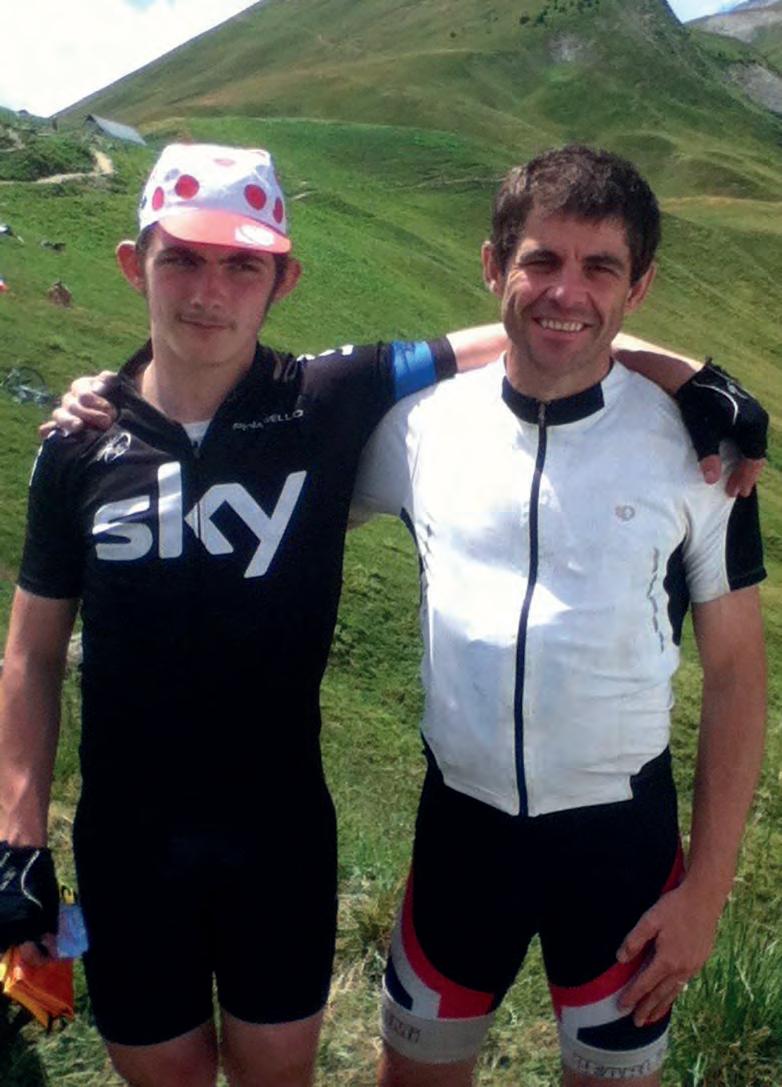
If we’re going to understand the sequence of events that is leading an increasing number of our young people to consider, attempt, or successfully kill themselves then we must understand the factors that can lead to this. This needs clinicians responsible for the health of young people to work with schools, other healthcare professionals and organisations to change things. This is our business, and we cannot hide from it but claim to care about the health of children. Our job is not to cure disease. Our job is to do our bit to help children to grow into adults who can take their place in the world, and this requires a major frameshift in the way that we think, act and collaborate.
Resources
Hampshire CAMHS videos and podcasts
hampshirecamhs.nhs.uk/ videos-podcasts
CALM
www.thecalmzone.net/whatwe-stand-for Papyrus
www.papyrus-uk.org
Mental health first aid courses
mhfaengland.org



Shout
giveusashout.org
Kooth
www.kooth.com
Stop, Breath, Think
www.stopbreathethink.org.uk
Young Minds
www.youngminds.org.uk
Youth Access
www.youthaccess.org.uk
Samaritans www.samaritans.org
FEATURE Milestones SPRING 2022 17
Ian and James cycling a few years ago in the Alps
Collaborative working in paediatric mental health
Meeting the mental health needs of children and young people demands a shared vision, effective communication and trust.
Sarah Johnson and Dr Julie Alderson explain how their roles dovetail at Bristol Royal Hospital for Children (BRHC)
Sarah Johnson Senior Nurse Lead for Children & Adolescent Mental Health University Hospitals Bristol &




I AM A SENIOR PAEDIATRIC NURSE with a background in adolescent ward management. My role is lead for mental health at Bristol Royal Hospital for Children NHSFT. This gives me operational oversight. From this position, I can coordinate the range of services that work on meeting children’s mental health needs. I am always looking to improve communication and collaboration between patient pathways and quality improvements.
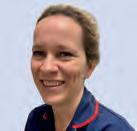
My close colleagues are not only the paediatric ward managers and duty team; I have meetings with Julie (right) as paediatric lead for psychological health services and with our inpatient Paediatric Liaison Service (PLS) comprising mental health practitioners with sessions from a child and adolescent psychiatrist and a clinical psychologist. We also share a work-plan as part of the Children’s Mental Health Operational Group, which is a partnership forum for working with community children’s mental health services that in-reach to our emergency department and wards. My input is extended to a second operational group focussed solely on 16 to 17 year olds who are treated in our adult divisions. An example of my operational leadership is chairing the BRHC Eating Disorders Team, having managed the task force that worked to establish this new service.
Our flagship achievements include the development of a mental health support worker role. These workers are trained inhouse and supported by PLS. They provide knowledgeable, sustainable mental health support for children whilst significantly reducing agency nursing costs. We have also worked hard to establish a band 7 mental health practitioner’s CAMHS advocate in our children’s emergency department and have worked with our adult mental health colleagues to establish a protocol for referring patients and carers for the local and rapid help they need, as part of our duty of care.
BRHC IS A TERTIARY PAEDIATRIC
centres, mental health specialists are part of many – but not all – patient pathways, depending on historical commissioning, service specifications etc. As lead, Sarah helps us represent our patients and our work in partnership bodies outside the hospital and her oversight of inpatient paediatric liaison and ED CAMHS advocacy services helps us work together in a timely way.
CENTRE offering shared care and managed networks for commissioned services. Many of these involve multiprofessional teams including paediatric clinical psychologists, neuropsychologists and social workers. We work from the start point of referral, throughout the patient journey, via episodes of care to help prevent or treat mental health problems. This involves taking a ‘family as the patient’ approach and supporting the clinical team to manage the personal-professional impact of service delivery. In tertiary paediatric
Julie Alderson Consultant Clinical Psychologist, Psychological Health Services Lead for Women and Children’s Division University Hospitals Bristol & Weston NHS Foundation Trust
Like many NHS services, we have suffered with staffing problems since 2020 but BRHC Psychological Health Services have made a commitment to be as responsive as possible, using every element of capacity we have. We have set up a referral route for one to three appointments for advice, guidance and signposting, whereby patient pathways without clinical psychology can request a short-term consultation if the patient does not meet the criteria for inpatient paediatric liaison. We also use this process when we have a vacancy in a commissioned service. The clinical psychologists and neuropsychologists at BRHC provide regional and national leadership in many of our specialty clinical areas.
Sarah and I work closely offering peer support with our varied divisional tasks including being a working pair to get jobs diarised and done. Our different professional backgrounds mean we see a task from different perspectives and bring different skills. We draw in emergency care paediatricians, adolescent specialists, liaison teams or our colleagues from the specialties as needed. This joint team approach is invaluable.
FEATURE
18 SPRING 2023 Milestones
Weston NHS Foundation Trust
Dr
Working with young trans and gender-questioning people
We all know that a key part of a young person’s development is exploring and coming to understand and express their own sense of self. We are here to enable them to thrive, whoever they are and whoever they become
Simon Croft Director of Professional and Educational Services
Gendered Intelligence
@Genderintell
AS PROFESSIONALS , we know that every young person should be respected and supported in a positive, open and non-judgmental way. At Gendered Intelligence, we know that approach is not something young trans or gender questioning people can always take for granted in all areas of their lives. A lack of understanding, recognition and support is a major contributor to mental illhealth amongst young trans people, and we regularly see those effects.
So knowing the basics of trans-inclusive practice is important, especially as every professional will work with young trans people at some point.
Here are three top tips that will help you get off to a good start. There are plenty more on our website (see below).
Use the young person’s chosen name and pronoun

Respecting the young person’s name and pronoun (e.g. he, she, they) is one of the most important things you can do – it makes the young person feel seen, respected and safe and has a significant impact on mental wellbeing. Young people may try out different names and pronouns, so be prepared to change!
Avoid assumptions
If a young person tells you that they are, or think they may be, trans, it’s important not to make assumptions about
what that might mean. That includes assumptions about their gender identity, their chosen pronoun(s), the spaces they want to use (toilets, washing facilities), their presentation (clothes etc), or their interests. It can also encompass the words they use for parts of their body. Don’t be afraid to ask.
Respect privacy and confidentiality



Pay particular attention to physical privacy and confidentiality. If a young person tells you they’re trans, ask them if their parents know. If not, don’t automatically assume they should be told. Use your professional judgment around safeguarding and Gillick competency, remembering that being trans is not in and of itself a safeguarding matter.
Gendered Intelligence
Terminology
People may use the term ‘trans’ to describe themselves if their own sense of gender (their gender identity) does not match or sit easily with the sex they were assigned at birth. Trans is an umbrella term which can include a very diverse range of gender experiences, including non-binary and fluid identities.
Any professional working with children already has the skills and competencies needed to support young trans people effectively – it’s usually a matter of gaining confidence, context and knowledge, to bring those skills to bear.
For a young trans person, your understanding and support is invaluable.

Gendered Intelligence (GI) is a UK-based registered charity, which has been working since 2008 to increase understandings of gender diversity and improve trans people’s quality of life. GI has extensive experience of direct youth work with young trans and gender-questioning people and provides training and consultancy to help organisations and professional individuals develop transinclusive practice. Visit: www.genderedintelligence.co.uk

FEATURE Milestones SPRING 2023 19
Mind the gap
Are we letting young people miss out on health services they need?
Alongside NHS England, the Association for Young People’s Health (AYPH) has been pondering a question – and we asked some of you to consider it too
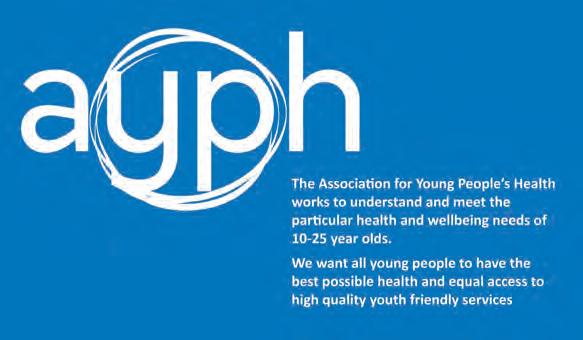
ARE YOUNG PEOPLE
NEARING THE AGE OF OUTPATIENT SERVICE cut-offs missing out on appropriate healthcare when a new referral is made?
Unfortunately, it looks like the answer is “yes”. One young person we spoke to had waited over a year to access appropriate services, and a GP spoke of a 17 year old inappropriately rushed through paediatrics after a traumatic event in order to “squeeze her in” before a cut-off kicked in.
In our scoping review, available on the AYPH website, we sent a survey to paediatricians, GPs and adult medics to ask if this was an issue in their practice. Of the 106 people who answered, 85% of GPs, 75% of paediatricians and 58% of adult physicians said yes, this was a problem.
What we found was:
Age cut-offs vary even within the same hospital. You can be too old for paediatrics, but too young for adult services. GPs are more likely to think this is a difficulty than adult physicians. Often the GPs are the ones holding the complex case that needs secondary care, but no service can offer support.
Inequalities appear to impact on young people’s ability to navigate this part of the system. Those young people and their families least able to self-advocate will be less able to get the care they need.
Automated referral systems are a potential issue. If these have hard cut-offs for age, then how do we advocate for developmentally appropriate health care?
Currently the answer seems to lie partly in professional relationships, flexibility and discretion.
All of this results in a potential service provision gap of one year or more for young people.
Since starting to do this work, we are noticing regular examples of young people suffering because of this. For example –the 17 year old under CAMHS for ADHD medication review who cannot access cardiology investigations between 16 and 18 years old, so can’t have his medications adjusted, exactly at the time he is studying for his A-levels. We know that accessing good quality healthcare at this age improves future health outcomes, so we aren’t helping the individual or the system in the end.
As a paediatrician you might think this is for the adult teams to work on, not us. But who are the experts in considering all the needs of a young person or child? As one adult physician said: “It is much easier to envisage paediatrics extending to this
age range where educational/social impact is a continuation of that experienced in adolescence (<15 years) than adult services that have to cope with the needs of 16 year olds as well as 90 year olds.”
We’re asking our colleagues in paediatrics and child health to ask your teams: “How do we reduce these barriers to access?”
Here are some discussion starters:
How many 15 to 19 year olds are using any of your hospital services?
Are there different age cut-offs for paediatric and adult services?

Could a working group be put together to lower barriers to access for this age group?
Working to improve transition has been a huge part of the College’s work and NHS England’s agenda and this is a complementary question we can all consider. We look forward to hearing your thoughts and ideas about this and learning how we can work together to improve health outcomes for young people by addressing their access to high quality care. Get in touch with AYPH at info@ayph.org.uk. Visit:
FEATURE
20 SPRING 2023 Milestones
ayph.org.uk/improving-access-to-secondary-care-for-young-people
Dr Lizzie Wortley
Paediatric Registrar University College Hospital, London @LizzieWortley
Asthma – the most common chronic disease of childhood
The UK has some of the worst asthma outcomes in the developed world. In order to improve outcomes for children and young people, we must think radically and ambitiously
THE NATIONAL BUNDLE OF CARE FOR CHILDREN AND YOUNG PEOPLE WITH ASTHMA published by NHS England provides a blueprint of how asthma care should be delivered from prevention to diagnosis, to acute and chronic management.
NHS England’s Children and Young People’s Transformation Programme has funded resources to regions and systems to support the delivery of the bundle and built a community of practice to share learning and best practice.
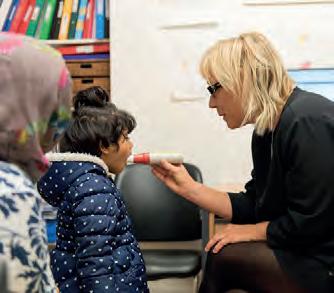
Asthma is the most common chronic disease of childhood, affecting 1 in 11 children. Over 90% of asthma deaths in children are likely to be preventable and a young person living in the UK today is more likely to die from asthma than in any other high-income country. The impact of asthma on their life will be greater for them than for almost any other age group.
Two high profile reports, the National Review of Asthma Deaths 2014 (NRAD) and the Healthcare Service Investigation Branch Report into childhood asthma 2021 (HSIB), highlighted systematic failings in the way we deliver asthma care in the UK, with common avoidable factors contributing to poor outcomes. Both reports made recommendations, but with no funding or support to match, there had been little progress in meeting these recommendations.
In 2019, NHS England made a commitment to improve asthma outcomes for children and young people (CYP), providing a welcome opportunity to address the recommendations.
These ambitions have formed the foundations of The National Bundle of Care for Children and Young People with Asthma. Published in September 2021, it builds on the opportunities offered by the formation of the new integrated care systems and provides an evidencebased framework for local systems to lead improvements in all aspects of CYP asthma care. Crucially the bundle is supported with funding and resources to enable implementation and delivery.
The bundle is divided into five main components covering all aspects of a child’s asthma care. Cross cutting each of these components, it also looks at how care is organised within systems, data and digital aspects as well as training and education.
Improving education and training
The NRAD and HSIB reports recommend the need for asthma-specific education for healthcare professionals. A report from the Association for Young People’s Health also highlighted young people’s views that a lack of asthma awareness and knowledge in



non-healthcare professionals was adversely affecting their asthma care.

An ambitious plan set out in the bundle is that any professional, healthcare or otherwise, who may come into contact with a child with asthma, should be supported to have the appropriate skills and knowledge to provide asthma care relevant to their role. It builds on the premise that all professionals have a role to play in improving asthma outcomes. Just one meaningful encounter with a well-informed professional could make the difference.
To help deliver this ambition, there are now nationally agreed CYP asthma capabilities outlining the core skills and knowledge needed to allow different professionals to care for a child with asthma, safely and effectively. The capabilities are divided into five tiers reflecting the different levels of care individual professionals may provide.
There are free, accredited eLearning modules aligned to the learning outcomes for tiers 1, 2 and 3 which take 45 mins, 2.5 hours and 4 to 6 hours respectively. There is a commercial eLearning programme for tier 4 providers. For regions that wish to develop their own learning packages, there is an accreditation process provided by the College and the RCGP that will allow them to do so whilst still assuring learners with quality of learning. Learners at tier 4 and 5 levels may choose to complete a portfolio of evidence.
Since the launch of the tier 1 and 2 training modules in summer 2022, and later tier 3, over 15,000 learners have enrolled on courses nationwide. So, take a look and together, we can rise to the challenge of improving outcomes for CYP with asthma.
FEATURE
Milestones SPRING 2023 21
Dr Jen Townshend Consultant General and Respiratory Paediatrician Great North Children’s Hospital
Visit: www.e-lfh.org.uk/programmes/children-and-young-peoples-asthma
Asthma affects 1 in 11 children
The latest member news and views
Turn your journal reading into ePortfolio evidence!
KEEP IN TOUCH
We’d love to hear from you, get in touch through our channels
Twitter @RCPCHTweets
Facebook @RCPCH
Instagram @RCPCH
milestones@rcpch.ac.uk
Dr Emma Dyer ST6 Paediatric Emergency Medicine Trainee Evelina London Children's Hospital


 ADC Section Editor @EmmaMDyer
ADC Section Editor @EmmaMDyer
ALL COLLEGE MEMBERS have access to Archives of Disease in Childhood (ADC), including the Education and Practice edition (E&P) – particularly aimed at trainees. You can find articles such as summaries of the latest paediatric guidelines, best practice articles such as 15-minute approaches to managing common paediatric presentations, innovative QI ideas, judicious use of investigations, medical education concepts, medicine updates, public health and much more. The good news is that whilst you are absorbing all the useful tips and interesting information they have to offer, trainees can also use this to evidence learning on their ePortfolio against the Progress (soon to be Progress+) curriculum.
Perhaps you’ve looked at an article to help you answer a question about a patient’s management that you weren’t sure about. The ‘Clinical Question’ development log on the ePortfolio can be used to record what you learnt from this and can then be linked to the relevant key capability within the curriculum. You
can also include more general reflections on articles that you have read in your ePortfolio or use journal articles to help with initial reflections in your CBD assessments, as a resource you used to further your learning or understanding of the case.
One of the curriculum areas that trainees have to evidence is involvement in research, including demonstrating critical appraisal at all levels of training –so why not pick an article to lead a journal club on to demonstrate this capability. You can also publish in this peer-reviewed journal using your day-to-day activities, topics and questions or even become a peer-reviewer. This is especially valuable for senior trainees – and of course, you can use that to evidence research capabilities on your ePortfolio.
If you are an educational supervisor, or a senior trainee, and you are completing feedback for an assessment, why not signpost the trainee towards an article that they can use to consolidate their learning or expand their knowledge of the area further.
There are lots of varied and different ways to evidence the Progress curriculum, these are just a few ideas using ADC! Get all the latest articles, sign up for email alerts and find out more if you’re interested in writing or reviewing at: ep.bmj.com
Happy reading!
ACHIEVING AN EDUCATION with a chronic health condition is difficult, particularly when considering attending university with all the additional demands that living independently entails.
At University College Hospital, London we decided to seek out the support of some of our expert patients, together with the expertise of a disability support officer, to assist in creating an accessible webinar to consider what the young people would have liked to know going to university and the support available.
The advice shared was for young people to disclose their condition when applying as this provides best access to reasonable adjustments, appropriate accommodation, support to apply for Disability Student Allowance and tailor-made support (that is regularly reviewed). The expert patient group shared the importance of young people doing ‘whatever works for you’; not being afraid to ask for help; using what is offered with regards to online lectures, deadline extensions as well as budgets for software and equipment. Among the practical tips shared was the importance of managing time and therefore energy by pacing out work, as well as tips such as to batch cook or organise online shopping. Preparing by building physical stamina where possible and doing some domestic activities before starting university was also thought to be helpful.
Catherine Carey TRACCS Therapy Lead University College Hospitals NHS Foundations Trust
Results from pre and post polls showed that young patients were surprised by the amount of support available and felt more confident they could manage at university following the webinar.
With our newly developed webinar it is hoped that health professionals will find they are better equipped to enable young people with chronic health conditions to see that they too can attend university.
22 SPRING 2023 Milestones
Starting university with a long-term health condition Visit: youtu.be/cnlQmljYdK0
HISTORY TAKING: FROM WHITECHAPEL WITH LOVE
Dr Richard Daniels Paediatric Registrar (OOP) Humbl @DrRDaniels





FUN FACT #1: Mental health care was publicly funded for 100 years before the NHS was founded. Fun Fact #2: Not for children. The first child hospital opened in Paris in 1802, but the earliest precursor of CAMHS was set up in 1927. Prior to this, children were treated in a hospital ward or adult asylum. 2023, meet 1923, meet 1823.
The East London Child Guidance Clinic opened in Spitalfields under the guidance of Dr Emmanuel Miller, a polymath whose academic qualifications included multiple degrees in natural sciences, psychology and the conjoint qualification of MRCS and (eventually) FRCP, as well as being a renowned artist. Established as a charitable endeavour by the Jewish Healthcare Organisation in the basement of Jews’ Free School (JFS), most of its patients were referred by schools for behavioural issues, learning difficulties or developmental delay. Ironically, referrals for phobias, anxiety and depression were rare. Children from all backgrounds were eligible for treatment.
It was staffed by a psychiatrist, a psychologist and a social worker – this troika engaged a novel model tackling the ‘mental attitude’, enabling the child to develop resilience to the hardships faced in East End life, with remarkable success, given the limited tools available.
The data from this clinic was fascinating and provided threads for nascent psychiatric research. Many children had a parent previously treated in an asylum and 30% were found to have normal or higher intelligence.
Unfortunately, the clinic closed in 1939 when JFS was evacuated outside London. It reopened after WW2 in the London Jewish Hospital as part of the new NHS.
AFTER A NUMBER OF REQUESTS, we are kicking off 2023 with a savoury bake. My guilty pleasure in life is carbs, with bread being one of my firm favourites. It might be easier to pick it up at the supermarket but honestly it is worth the effort baking bread at home. The texture is unbelievable, it tastes delicious plus it makes your house smell amazing. One of the simplest bread bakes to get started with is focaccia. The dough is easy enough and then you can flavour it how you wish – rosemary, garlic, tomatoes, olives, go wild! Perfect when dipped in olive oil and balsamic vinegar, trust me, it will all be gone by the end of the day.
Focaccia
INGREDIENTS
Dough
500g strong white bread flour
8g fine salt
10g fast-action dried yeast
30ml olive oil, plus extra for oiling
370ml water
Topping

Your choice! (I went for olives and cherry tomatoes)
150ml olive oil
Sea salt flakes
Oregano
Instructions
1. Add all your ingredients for the dough into a large mixing bowl. I cheat and use my stand mixer with a dough hook to mix and knead the dough for around 10 minutes. You can do this by hand on a lightly oiled surface, kneading until soft and elastic (about 10 minutes).

2. Place the dough in the bowl, loosely cover it with cling film and allow it to prove at room temperature for two hours until it has doubled in size.
3. Lightly oil the base of a shallow
rectangular baking tin (30x20cm roughly), tip the dough into the tin and stretch it to fit the dimensions of the tin.
4. Drizzle with olive oil and make firm indentations all over the surface of the dough. Cover in cling film and allow to prove for 90 minutes.
5. Add your toppings, pressing them firmly into place and distributing them equally across the dough surface.
6. Drizzle with more olive oil, and sprinkle with oregano and sea salt flakes.
7. Bake the focaccia in your preheated oven at 190°C (fan assisted)/210°C non-fan assisted for 20 minutes or until golden brown. Drizzle with more olive oil when you take it out of the oven and then leave to cool. Enjoy!

MEMBERS Milestones SPRING 2023 23
Dr Ashish Patel ST8 Paediatric Nephrology & Sim Fellow Birmingham Children’s Hospital @DrKidneyAsh
MEMBERS
Reflections on the changing complexity in general paediatrics


I HAVE GROWN 27 YEARS
CORE COMPETENCIES
WITH A PRICE!
Dr Geeta Subramanian Consultant Paediatrician Queens Hospital, Romford
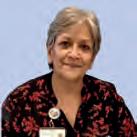

OLDER as a consultant general paediatrician in the NHS and am towards the end of my career in some ways, yet the changing complexity of diseases in children keeps me alert, active and enthused.

We are not just busy, but busy with clinical patterns and scenarios that many of us have not seen in all our combined years of practice. What with massive pulmonary embolism in a previously well adolescent, missed posterior urethral valves presenting as constipation at three years of age, coeliac disease presenting as lip swelling and cheilitis and mental health admission on one occasion, requiring multiple security personnel in constant attendance. 30% bed occupancy with selfharm in a general paediatric ward at one point during the pandemic, over 400 paracetamol overdoses attending the accident and emergency over five years, the new sick cases and learnings of PIMS-TS from the pandemic and on it goes.
There are more families with more than one child affected with complex genetic disorders
causing not just neurodisability but multisystem affliction. We have a whole spectrum from the familiar to an increasing number of the less familiar genetic neurodisability. These children are frequent flyers with prolonged inpatient stay. Inpatient complex neurodisability seems like a specialty in secondary care. They are on an endless list of medications – as many as 10 or more – and rationalising inpatient prescribing is an event.
The stream of complexity and numbers is ever enlarging, and I am relearning paediatrics in some ways. I am required to have much more speciality knowledge. Our ward rounds are not conclusive. Doctors spend a big part of their daily time in consultation with tertiary centres.
There are areas where great strides have been made. Asthma cried for attention and is receiving due attention and resources; we are already seeing the benefits. Diabetes mellitus was a trailblazer in chronic disease management and has been a great example of focussed multidisciplinary attention. Our medical and specialist nursing teams are much bigger and while it adds value, it does not diminish the increasing responsibilities of secondary care.
Curiosity, diligence, and constant learning are the needs of the era and are the trio that have kept me alert and afloat. There’s never a dull moment.
PAEDIATRIC INTENSIVE CARE GRID TRAINEES, like anaesthetic trainees, must achieve core anaesthetic competencies – Initial Assessment of Competencies (IAC) in an approved anaesthetic setting. This basic formal academic assessment of anaesthetic training involves learning how to assess patients preoperatively and communicate risk; deliver safe anaesthetics; and practical skills like intubation, ventilation, and managing haemodynamics in theatre.
If you’re not a sub-specialty trainee, IAC requires an OOP application, so plan six to 12 months in advance. It may also be possible to apply for trust doctor CT1 level anaesthetic posts, but departments may prefer doctors with an anaesthetic background. If applying for these jobs, make sure the department is willing to train you in IAC.
Novices are supervised one to one in theatre and initially do on-calls alongside a senior trainee. You learn to assess patients pre-operatively, plan the choice of airway device and anaesthetic. Patients may require invasive monitoring, central access and inotropic support. You learn to prescribe and draw up anaesthetic medications, deliver them safely and become familiar with reversal agents. Don’t worry if the differences between anaesthetic and paediatric training feel daunting, as a paediatric trainee your skills in venous access and dealing with noncooperative children shine, boosting your confidence.
The College provides anaesthetic consultants with support and free access to Kaizen whilst a supervisor, but you must meet regularly with your supervisor and explain the process.
After my IAC I feel competent in the use of supraglottic and endotracheal airways, and leading the team managing critically ill patients. I also developed a joint paediatric multidisciplinary simulation, involving anaesthetic, emergency and paediatric departments, a great learning tool.
These skills don’t only benefit PICM trainees; airway-trained paediatricians are a great asset to any department. With the ability to take OOP time in Progress+, these core competencies could be a first choice for PICU aspirants and general paediatric trainees aiming to work in a high dependency unit.
Dr Vikas Saxena ST 7 PICU Registrar Queen's Medical Centre, Nottingham
24 SPRING 2023 Milestones
COMES
We put 10 questions to a consultant paediatrician and her paediatric trainee
Dr Arpana Soni Consultant Paediatrician, Whittington Hospital, London

1) Describe your job in three words. A privilege, demanding and fun!

2) After a hard day at work, what is your guilty pleasure?
A quiet cup of tea and a packet of Mini Cheddars (no judgement please) before facing bedtime battles.
3) What two things do you find particularly challenging?
a) The magnitude of NHS IT systems that don’t talk to each other.





b) Witnessing the impact of health inequalities on our babies, children and young people.
4) What is the best part of your working day? Multidisciplinary team working/meetings around a child and family – the key to truly successful patient outcomes.
5) What is the one piece of advice you wish you could impart to yourself as a junior trainee? Quiz all your colleagues about their professional journeys. You will be inspired by the many opportunities that are out there to grasp and shape your own career.
6) Who is the best fictional character of all time, and why? Belle from Beauty and the Beast, an independent heroine with an active imagination, fuelled by reading.
7) What three medications would you like with you if you were marooned on a desert island filled with paediatric patients?




Paracetamol, ORS and amoxicillin
8) If you were bitten by a radioactive gerbil, what would you like your superpower to be, and why? To be able to understand and speak all languages. This would excel my clinical practice and be helpful on holiday too!
9) What is the single, most encouraging thing that one of your colleagues can do to make your day? Offering me a cup of tea (bonus if they check how much milk – I'm a fussy tea drinker)
10) How do you think you and your colleagues can inspire the next generation of paediatricians? Exposing them to the joys of a career in paediatrics, the variety and learning that takes place during every patient encounter and the team spirit, how together (if we shout loud enough) we can improve child health for all.
Dr Mouse Barnes ST1, Whittington Hospital, London @mouse_barnes
1) Describe your job in three words. We welcome chaos!
2) After a hard day at work, what is your guilty pleasure? As a part time trainee and part time yoga teacher, it must be yoga! It helps me to stay warm and compassionate.

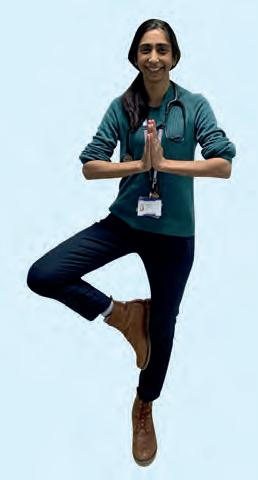
3) What two things do you find particularly challenging? Accepting that as healthcare professionals we are only part of the solution is tough, especially for our mental health patients who need support from social and education sectors. I also wish we had more in-person interpreters we could work with.
4) What is the best part of your working day? I always ask children what they want to be when they grow up. The answers I have heard are inspirational and hilarious.
5) What is the best advice you have received as a trainee? Choosing things that I love, rather than things that I am good at, is likely to be more productive.
6) Who is the best fictional character of all time, and why? Paddington! He sees the best in everyone and is always kind.
7) What three medications would you like with you if you were marooned on a desert island filled with paediatric patients? The holy triad of paracetamol, ibuprofen and difflam.
8) If you were bitten by a radioactive gerbil, what would you like your superpower to be, and why? To genuinely be able to boost peoples’ confidence.
9) What is the single, most encouraging thing that one of your colleagues can do to make your day? Display an intact sense of humour.
10) How do you think you and your colleagues can inspire the next generation of paediatricians? As paediatricians we are so privileged to have a role in advocacy for children and families. I think this is becoming more and more relevant as we see our communities change with the global refugee crisis. I hope that we can inspire the future generations to demand the best care for these families too.
MEMBERS
STARTER FOR TEN KEEP IN TOUCH Milestones SPRING 2023 25
@RCPCH @RCPCH milestones@rcpch.ac.uk
@RCPCHTweets
BOOK REVIEW: THE EXPLORER

 by Katherine Rundell
by Katherine Rundell

WHILST I WAS in hospital, I found reading was a helpful way to calm myself and was great for coping with the boredom in between visitors. The book that I would like to recommend is called The Explorer and is written by Katherine Rundell. The book tells the story of four kids, (Fred, Lila, Con and Max) who have been stranded in the Amazon after a plane crash, and their journey throughout the forest. I found this novel transported me to a world of adventure, action and excitement when I felt down or upset. I really enjoyed this story and I would recommend this from any age of eight and onwards.
BOOK REVIEW: A HEART THAT WORKS
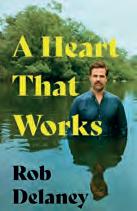 by Rob Delaney
by Rob Delaney

IF EVER A BOOK needed a trigger warning on its cover… This is the story of American comedian Rob Delaney’s son Henry. Shortly before his first birthday, Henry was diagnosed with a brain tumour; necessary surgery left him with significant disabilities. His family learned to care for Henry at home, but his cancer rapidly returned, and he died.
I’ve tried several times to write this review, starting then erasing sentences. “As a doctor in PICU, I reflected that…” somewhat a la ePortfolio reflection. But that's not the right review. It’s a rant, this book. It’s a fierce book, fierce in its fury, fierce in its love; above all it’s a love letter to Delaney’s beautiful boy, Henry. Delaney punches the page with his words, making you snort with inappropriate laughter (you’ll know when you get to the bit about the grandfather’s cancer) then wipe your eyes – because he’s right, it isn’t fair that these things should happen, and even as a doctor who can cope with work where children die, this book delivers a gut-punch. Read at your peril, but if you can – do read it.




Milestones


REVIEW: OUR EARTH YOUR CHOICE – A VIDEO GAME ABOUT CLIMATE CHANGE



OUR EARTH YOUR Choice is a video game developed by 25 young people with arts organisation One to One Development Trust with the hope of shining a light on climate issues. The project gave voice to our concerns and opinions about the environment. We stand to show there is still hope for this world, anyone can help, but people need to act.
When Dr Guddi invited us to speak at the adolescent health conference we had to go! It was a great opportunity to align our ideas in promoting the game and gave us a chance to demonstrate how capable young people are and how we should be listened to.
THE PROJECT HAS been a great experience for me, helping gain back confidence lost during lockdown, I was also able to improve my art skills more than I would have at school. The most rewarding part for me was being part of the team and spreading our important environmental message, whilst celebrating diversity and acceptance. Throughout the project we all listened, shared ideas, had a few disagreements but always worked together to form a final decision. I would definitely be glad to do a project like this again.
GOING TO BIRMINGHAM was amazing, as it was a city I have never been to before. It was good to be able to talk about something that I care about. I was grateful to be there and seeing Dr Guddi was something I never thought would happen. Presenting to all the doctors and talking afterwards was exciting and very insightful. I felt like I had a voice and that’s very important to me.
Visit: www.ourearthyourchoice.co.uk
MEMBERS 26 SPRING 2023
ST6 Paediatrics Leeds Children's Hospital PICU I_am_spottacus Will Aged 12
Dr Maddy Fogarty Hover
Madison Aged 14
Tiara Aged 21
Consultant
Paediatrics in multicultural Malaysia
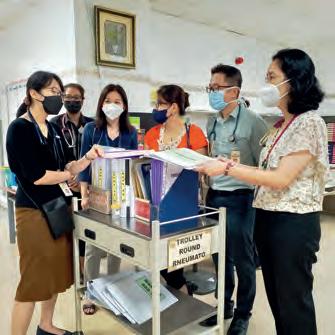

work with children. I completed my undergraduate medical studies in Malaysia and went on to train in paediatrics, qualifying in 2003. I went on to subspecialise in paediatric rheumatology, completing my fellowship training in Malaysia and Australia in 2010.
I currently work as a consultant paediatric rheumatologist and lecturer in a university hospital as well as a visiting consultant in the largest paediatric rheumatology centre in Malaysia. I am particularly passionate about conditions related to autoimmunity or immune dysregulation.


Malaysia offers mostly free universal healthcare at the point of use through a widespread network of government-run hospitals and clinics, much like the NHS in the UK. The motto of the Ministry of Health Malaysia is to provide care from ‘cradle to grave’ and therefore the range of healthcare services available to the public is extensive. This includes massive public health initiatives like immunisation programmes, and child and maternal healthcare services. In recent years, government health facilities have been struggling to cope with escalating costs, increasing demands of an aging population, more lifestyle-associated diseases, and ailing infrastructure. The private healthcare sector here has grown tremendously in the
past decade, but for most of the population, government healthcare facilities remain more accessible and are heavily used.
Working in a Malaysian hospital can be a unique experience as our patients come from various ethnicities and cultural backgrounds. Though much of the communication is in Bahasa Malaysia (our national language) and English, most doctors and paramedics speak a few languages including local dialects. You will often find doctors and nurses slipping in and out of various languages while doing a ward round or clinic consultation. This also often means that clinical decisions are often more nuanced, taking into consideration differences in cultural background and religious context. The best part of working in a multicultural society like Malaysia is getting to experience all these different facets. And of course, not forgetting the food! Malaysians are very hospitable and often patients bring us all sorts of dishes.
Much like the rest of the world, we are encountering more mental health issues among our children and adolescents. However, there is still a significant stigma
attached to mental health issues and resistance to seeking help. There are also challenges in accessing help and support in our traditional healthcare model.
Though Malaysia has an extensive network of public and healthcare facilities, there are still significant inequalities in healthcare access amongst different populations due to socioeconomic disparities. Stateless children and children from refugee communities are often disadvantaged as the state does not recognise them and therefore these children have no access to state-run facilities. Private healthcare facilities are beyond the reach of most of them. Children from some indigenous communities in the remote interior areas of this country continue to suffer from common childhood illnesses due to poor access to public health programmes and healthcare facilities. Climate change in recent times, with resultant worsening in flooding and land erosions, has also challenged livelihoods and intensified the struggles of children who are already living in poverty.
To me, being a paediatrician is a special calling; we are invited into a trusted family circle as we treat the child in the family. To have been able to share the experiences of young children as they transition from sickness to health and watch them go on to achieve their dreams has been gratifying.
My journey as a paediatrician has often been challenging – even daunting – and sometimes frustrating but ultimately fulfilling. I am privileged to have worked with many wonderful and compassionate colleagues, humbled to have been able to share the journey with many patients and their families, and grateful to have been a part of the paediatric fraternity for so many years.
Milestones SPRING 2023 27 INTERNATIONAL
From early on in my medical training, I knew I wanted to
Malaysia has a unique blend of culture and languages, which leads to both complex challenges and rewarding encounters in paediatric care.
Dr Sern Chin Lim details her career working in the extensive Malaysian healthcare system and reflects on her journey as a paediatrician
Dr Sern Chin Lim
Paediatric Rheumatologist and Head of the Department of Paediatrics Hospital Al-Sultan Abdullah (UiTM)
Dr Sern Chin Lim with colleagues on their rounds
Wellbeing
Mental illness as a medic
Doctors often focus on how they can support patients with mental health issues, but what about their own mental health? @doc_bipolar, a paediatrician, details her own mental health, how it has impacted her career and why seeking help is important
WHEN I WAS offered the opportunity to write this article, I had planned to do it openly, to reveal my real identity, but the truth is, I don’t feel able to. A fear that stems from deep, ingrained stigma, one that makes doctors with mental health conditions fearful and ashamed. So, it is from behind a Twitter handle that I share my vulnerabilities in a hope that perhaps it will prompt others to feel able to share theirs too.
Breaking and mending
There is a hidden message in medicine, one we begin to learn at medical school: an unspoken expectation that self-sacrifice is part of the job. We anticipate working long hours, studying for difficult exams and being relentlessly dedicated to academic achievement until the day we retire, compromises we are more than willing to make for a rewarding and fulfilling career. With this in mind, I threw myself into medicine with great passion and enthusiasm. I picked up extra shifts, agreed to every project that was offered to me, cancelled social engagements in order to stay late, skipped lunch… The harder I worked, the more I felt validated by both patients and colleagues.
My self-esteem came to depend on self-sacrifice. But it was fine because giving myself to medicine made me a

good doctor; of that, I was sure. I had had periods of mental illness on and off since being a child, a shame that I carried throughout my training. Fear I would be found out, considered too weak for the job or worse still, struck off. So, I did my best to hide it. Not infrequently, I got triggered by colleagues referring to people with mental health conditions as ‘crazy’, ‘attention seeking’, ‘psycho’, ‘high maintenance’. This idea that somehow their illness has been self-inflicted or self-perpetuated. Not knowing what to do with those accusations, I internalised them, coming to believe them to be true about myself.
After the birth of my two children, life became more complex. I was recovering from postnatal depression when I returned from maternity leave and, with the little energy I had, I continued to progress through my registrar training, failing to acknowledge that what I really needed was a break. Although I remained clinically very competent, in order to access the pastoral help and support I needed, I was labelled a ‘trainee in difficulty’. My up-until-then successful career reduced to one single phrase. A judgement. A failure.
The truth was, I wasn’t in difficulty. I was unwell. Burnout. Anxiety. Depression. Falling
asleep at traffic lights, waking several times a night, empathy and compassion replaced with bitterness and resentment. I hated who I had become. Yet taking time off was inconceivable. Shame. Weakness. Convinced the professional repercussions would be too extreme, I continued to work, taking on leadership projects and teaching opportunities alongside my clinical duties. In my mind, everything had to be OK. A few months passed, I came off on-calls, was in therapy and on medication but despite this, my mind became foggy. Concentration and prioritisation became a challenge. Endless anxiety. Hopeless. Helpless. I sat in my psychiatrist’s office as he signed my sick note, tears streaming down my cheeks. Tears for the patients I was letting down, for the colleagues that I was burdening with extra work. Guilt. At no point were there tears for myself.
Three weeks of sick leave turned into 11 months, a diagnosis of type 2 bipolar and a conviction that I could never possibly practise medicine again. Yet with time and space, I began to recover and feel able to contemplate returning to training. With a compassionate mentor and a supervisor who really took the time to understand and support me, I embarked on a phased return. Over the following year, despite
28 SPRING 2023 Milestones WELLBEING
@doc_bipolar Clinical Fellow
enjoying the patient interactions, I felt unfulfilled and undervalued by a system that struggled to appreciate those that kept it afloat. The rigidity of training made it difficult for me to carry on and after much deliberation and many tears, halfway through my ST5 year I decided to walk away. I retrained as a primary teacher, a steep learning curve that occurred alongside the pandemic. The current mood in education is not dissimilar to that in the NHS, with staff feeling overworked and undervalued. After a year of teaching my own class, I began questioning my career change. I missed the patients, the communication and empathy, the sense of belonging you get from being part of an MDT, the intellectual challenge. Being a doctor was an integral part of my identity. Without it I felt lost.
So, I find myself tentatively returning to medicine, trying to find my place in a system that doesn’t make it easy for those of us with chronic mental health conditions.
Barriers to seeking help


During the year after I returned to work from sickness, I began to speak out about my experience of mental illness as a doctor. As I did, I realised that I had never really been alone. Senior doctors I had worked with had stories of their own, fellow registrars had been battling symptoms of burnout and, just like me, they felt ashamed. So why is it so hard for us to have these conversations?
There is often an image that doctors feel the need to conform to, an ideal that we are somehow invincible superheroes. We simply don’t get sick and therefore, stepping into the role of the patient doesn’t come easily. It leaves us feeling vulnerable. Embarrassed. Helpless.
That awkward role reversal.
In addition to this, many unwell doctors fear that being labelled will harm their career progression, that they will miss out on opportunities if seen as weak or unreliable. There is also a largely unfounded fear of being referred to the GMC. In fact, very few doctors with mental illness are investigated by the regulator and even fewer receive sanctions. Despite this and even when nothing illegal or negligent has taken place, the anxiety and belief that simply being mentally unwell warrants a referral remains pervasive.
As I went through my training, I looked at consultants spinning plates
Help is available
effortlessly, taking challenges in their stride, seemingly unphased by things that happened around them. I had created an ideal that I strived to achieve and emotion simply didn’t come into it. But what if I had realised that these same doctors had their own struggles, that they faced difficult emotions after upsetting cases in the same way that I did? With rates of burnout and mental illness amongst doctors being higher than ever reported, we must work to dispel mental health stigma and create safe spaces to discuss our own vulnerabilities.
Being unwell as a doctor isn’t failure.
Sometimes, despite our best efforts to set clear boundaries, to leave on time, to look after ourselves, things can become too much and it can be hard to navigate how and where to seek help. Here are a few useful resources to be aware of. There is no shame in needing to use them.

Deaneries can provide advice and resources
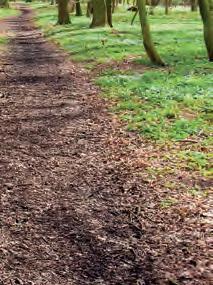




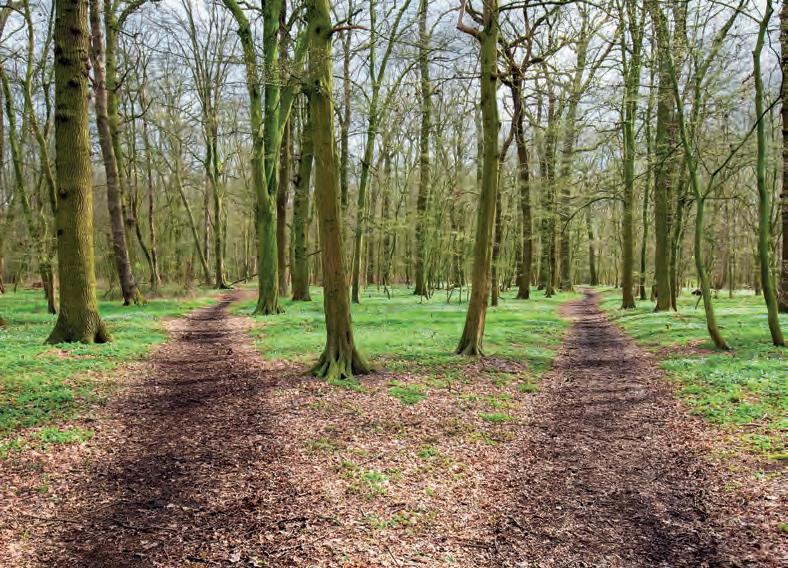
NHS Practitioner Health is a confidential NHS service designed for health professionals. www.practitionerhealth.nhs.uk
Doctors in Distress is a charity that runs support groups and creative workshops with trained facilitators. doctors-in-distress.org.uk
BMA wellbeing offers a 24-hour counselling phone line plus other resources. www.bma.org.uk/advice-and-support/your-wellbeing
You Okay Doc? is a charity that runs weekly online huddles, a safe space to chat with other medics. youokaydoc.org.uk
Milestones SPRING 2023 29 WELLBEING
Mental health problems can make it hard to know which way to go
“We can be change makers”
Dr Anna Kyle
 Consultant General Paediatrician, Mental Health Lead & Paediatrician for the Somerset Children’s Eating Disorder Service (CEDS), Musgrove Park Hospital @AnnaKyle12
Consultant General Paediatrician, Mental Health Lead & Paediatrician for the Somerset Children’s Eating Disorder Service (CEDS), Musgrove Park Hospital @AnnaKyle12
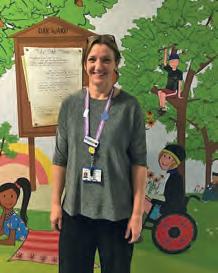
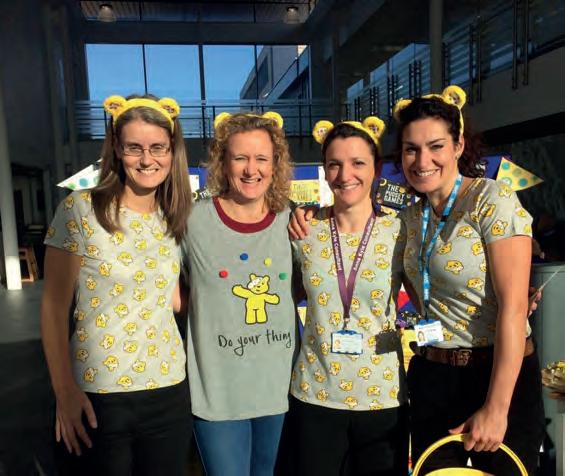
I became a paediatrician after being converted as an FY1! At medical school I wanted to be a psychiatrist but as I went through undergraduate training, I was drawn to paediatrics. I was one of the first FY1s (house officers back then) in the country to be offered a new ‘innovative’ job in paediatrics. House officers at the time did six months of surgery and six months of medicine. I was inspired by the wonderful paediatric doctors I worked with in Poole General as a ‘newbie’ and thought, “I want to do what they do!”. My desire to be a children’s doctor was then fuelled by a fabulous year at the Princess Margaret Hospital for Sick Children in Perth, Australia and working with some great people there. It was only in the later stages of my training that I developed and nurtured my old interest in psychiatry again and I am now happy to be working closely with colleagues in CAMHS.
My typical working day involves caring for adolescents with both mental and physical health challenges. I am passionate about delivering integrated care on our wards and work together with my likeminded CAMHS colleagues. I see young people in my outpatient clinics with persistent perplexing physical symptoms and I also run clinics alongside my psychologist and therapist colleagues in the Community Eating Disorders Service (CEDS). I also partake in the usual acute paediatric service weeks, on-calls and deliver general paediatric clinics. On a non-clinical day, I get stuck into anything that promotes the deliverance of parity of esteem for CYP on our wards. I might join a CAMHS participation group to hear about the experiences from CYP on our wards. I may support a debrief on a challenging case, help deliver a ward-based mental health simulation, or link up with colleagues from our newly formed South West Paediatric Mental Health Network to share and learn. If I am not in my office, I can generally be found doing an ad hoc home visit or in the CAMHS base jumping in on an appointment to offer a bit of joined-up care.
A DAY IN THE LIFE
The most difficult part of my job is saying no!
The best part of the job is receiving thank you letters from ex-patients who are now in their 20s, abroad somewhere and living their dream after a troubled time in their teens. I linger on those handwritten sentences splashed with the authors’ tears and re-read them at any opportunity: “You saved my life so many times, you never gave up on me, even when I was too sick to realise I needed help, you were there. Thank you for believing in me.” I never dreamed that treating mental illness as a paediatrician could be achievable and as rewarding as successfully resuscitating a collapsed infant, but it is. Sometimes we don’t see the ‘outcome’ as paediatricians on the ward, but these letters tell me it is achievable and we can be change makers.
My most memorable moment was being offered my consultant job! It might sound cheesy, but it’s no mean feat is it? We are a gutsy and determined lot, we have to be. After 15 years of training incorporating nine different DGHs, two teaching hospitals, two international house moves, and juggling the needs of a young family while trying to finish off a masters’ degree, being given a consultant job is the cherry on the cake. It has allowed me to breathe, slow down, feel grounded, and begin to live my life my way. My job now brings me so much satisfaction. So to any postgraduate doctors out there who are feeling downtrodden… stick with it, it’s worth it!
When I’m finished work, I like to get outside. I play hockey twice a week and enjoy the non-medical team banter and of course the after-match ‘teas’. I recharge with a dog walk or a run. Sometimes I climb a mountain. Fresh air, exercise and team spirit is a winning combo for me.

KEEP IN
TOUCH
30 SPRING 2023 Milestones @RCPCHTweets @RCPCH @RCPCH milestones@rcpch.ac.uk
Anna (second from right) with colleagues marking Children in Need
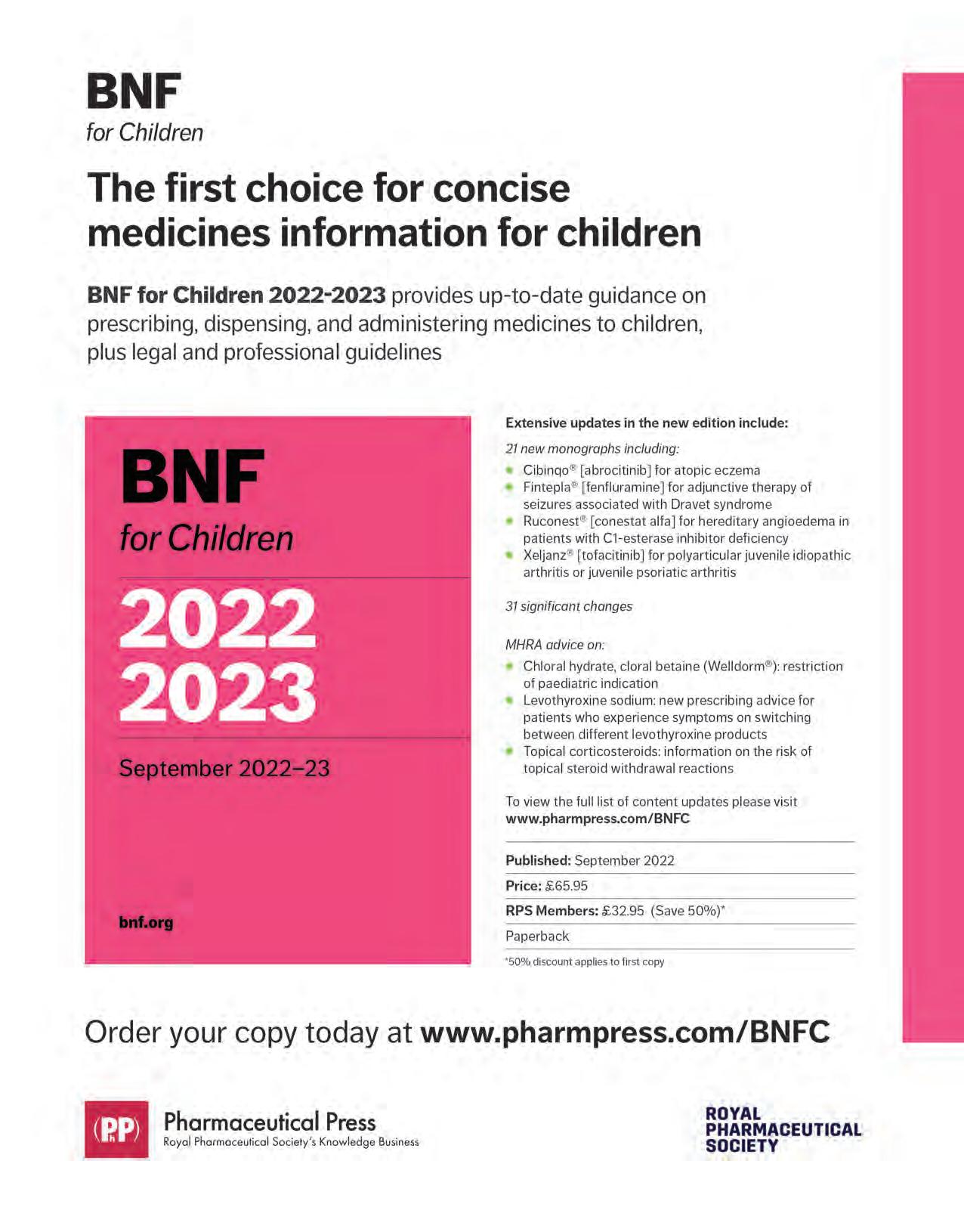
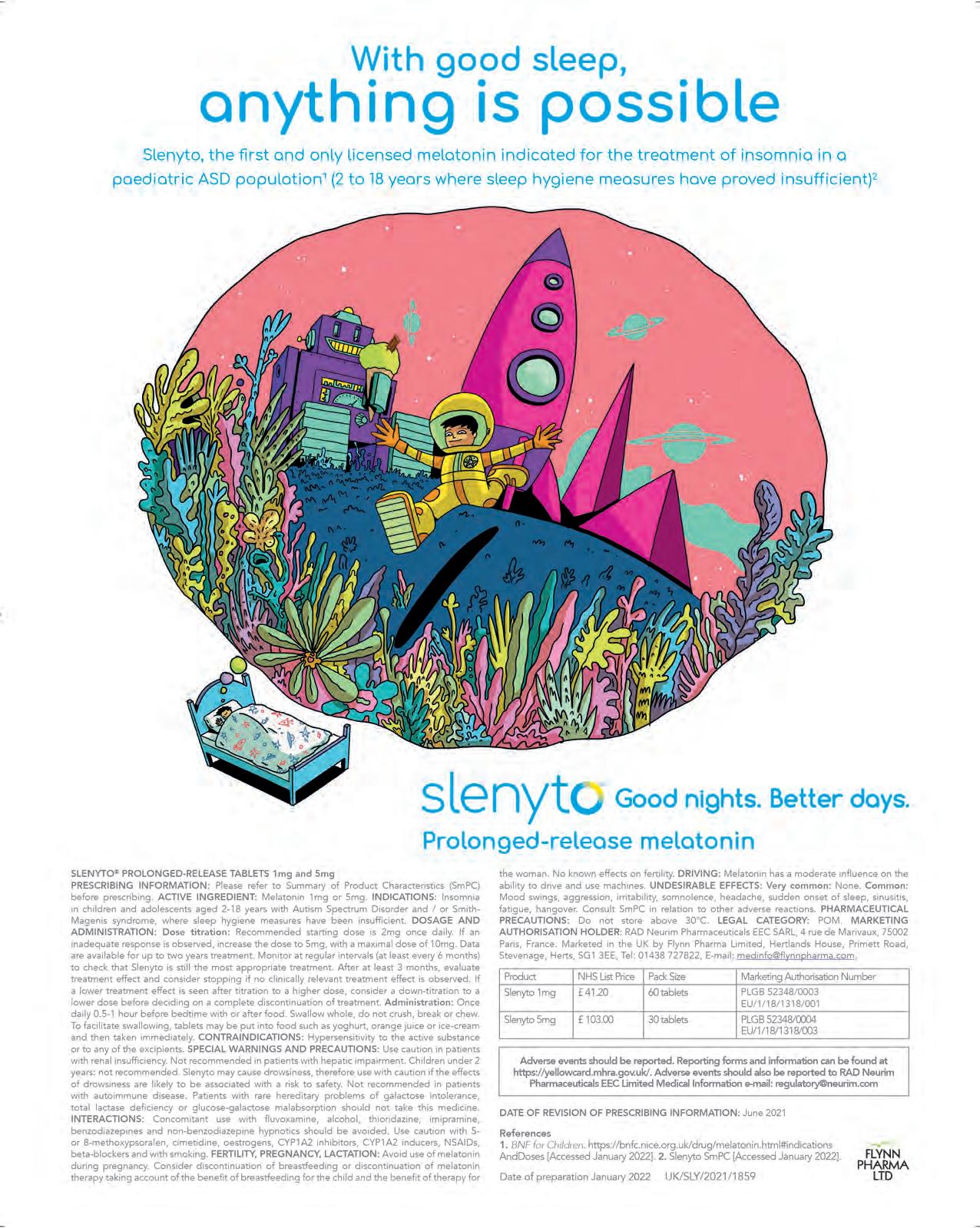












 Lead
Lead


















 RCPCH Officer for Genomics @ngozi_ediosagie
RCPCH Officer for Genomics @ngozi_ediosagie




























 Dr Olatokunbo Sanwo
ST8 Paediatric Registrar/ Child Mental Health Subspecialty Trainee Cambridgeshire Community Services @toks_dr
Dr Olatokunbo Sanwo
ST8 Paediatric Registrar/ Child Mental Health Subspecialty Trainee Cambridgeshire Community Services @toks_dr















 RCPCH Chair of Child Mental Health CSAC @PaedMHAssoc
RCPCH Chair of Child Mental Health CSAC @PaedMHAssoc



































 ADC Section Editor @EmmaMDyer
ADC Section Editor @EmmaMDyer
























 by Katherine Rundell
by Katherine Rundell

 by Rob Delaney
by Rob Delaney
























 Consultant General Paediatrician, Mental Health Lead & Paediatrician for the Somerset Children’s Eating Disorder Service (CEDS), Musgrove Park Hospital @AnnaKyle12
Consultant General Paediatrician, Mental Health Lead & Paediatrician for the Somerset Children’s Eating Disorder Service (CEDS), Musgrove Park Hospital @AnnaKyle12





